#if jacques is behind this it would be so funny
Explore tagged Tumblr posts
Note
Hello I have gossip updates

two fia accredited journalists…whose accreditation is worthless……..both of them i fear
#if jacques is behind this it would be so funny#like you can take the man out of the red bull pr team but you can’t take the red bull pr team out of the man#asks#wid
17 notes
·
View notes
Text
All the Films in Competition at Cannes, Ranked from Best to Worst
The twenty-two films that premièred in the 2024 festival’s main program offered much to savor and revile.
By Justin Chang May 26, 2024
The seventy-seventh annual Cannes Film Festival came to a startling and joyous conclusion on Saturday night, when the competition jury, chaired by Greta Gerwig, awarded the Palme d’Or, the festival’s highest honor, to “Anora,” a funny, harrowing, and finally quite moving portrait of a sex worker’s madcap New York misadventures. It was startling because the movie, though one of the best-received in the competition, had not been widely tipped for the top prize, which seldom goes to a U.S. film; with “Anora,” Sean Baker becomes the first American director to win the Palme since Terrence Malick did, for “The Tree of Life” (2011), thirteen years ago. And it was joyous not only because the award was bestowed on a worthy and remarkable film but because Baker used the occasion to deliver the best, most eloquent and impassioned acceptance speech I’ve ever heard a Palme winner give.
Reading from prepared remarks, Baker singled out two other filmmakers in the competition, Francis Ford Coppola and David Cronenberg, as among his personal heroes. He dedicated the award to sex workers everywhere, a fitting tribute from a filmmaker who has put their lives front and center, with drama, humor, and empathy, in movies like “Starlet” (2012), “Tangerine” (2015), and “Red Rocket” (2021). He tossed some exquisite shade in the direction of the “tech companies” behind the so-called streaming revolution—including, presumably, Netflix, which came away as one of the night’s big winners; its major acquisition of the festival, Jacques Audiard’s musical “Emilia Pérez,” won two prizes. And, in a moment that drew rapturous applause, Baker delivered a plea on behalf of theatrical films, declaring, “The future of cinema is where it started: in a movie theatre.”
I was fortunate to see all twenty-two films in the Cannes competition on the big screen, projected under superior conditions in houses packed with fellow movie lovers. It’s my hope that, when these movies are released in the U.S., as the great majority of them likely will be, you will seize the chance to see them on the big screen as well—even “Emilia Pérez,” which Netflix may not keep in theatres for long, but whose bold dramatic and stylistic risks have the best chance of winning you over if they have your undivided, wide-awake attention.
I have ranked the movies in order of preference, from best to worst. Here they are:
1. “Caught by the Tides”
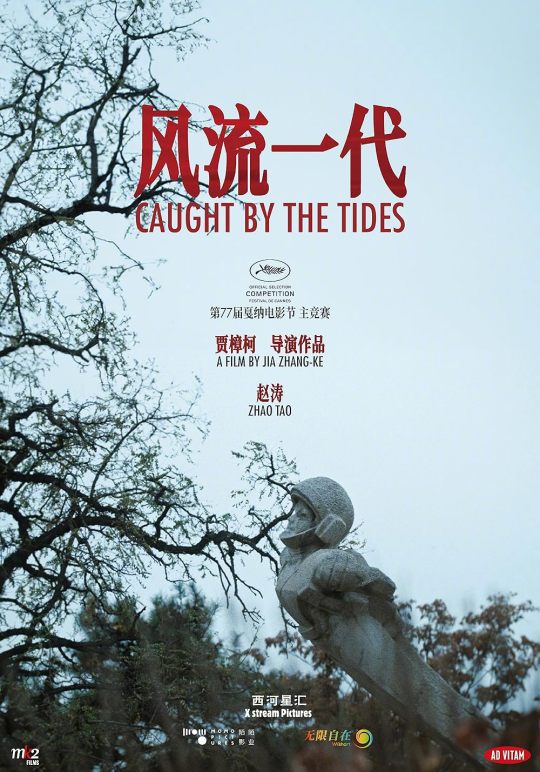
Jia Zhangke, a Cannes competition veteran, has long been the cinema’s preëminent chronicler of modern China (“Mountains May Depart,” “Ash Is Purest White”), mapping its social, cultural, and geographical complexities with great formal acumen, and also with the longtime collaboration of his wife, the superb actress Zhao Tao. Jia’s latest work, drawing on an archive of footage shot in the course of roughly two decades, unfurls a story in fragments, about a woman (Zhao) and a man (Li Zhubin) who fall in love, bitterly separate, and have a melancholy reunion years later. It’s an achievement by turns fleeting and monumental: a series of interlocking time capsules, a wrenching feat of self-reflection, and a stealth musical, in which Zhao dances and dances, standing in for millions who have learned to sway and bend to history’s tumultuous beat.
2. “All We Imagine as Light”
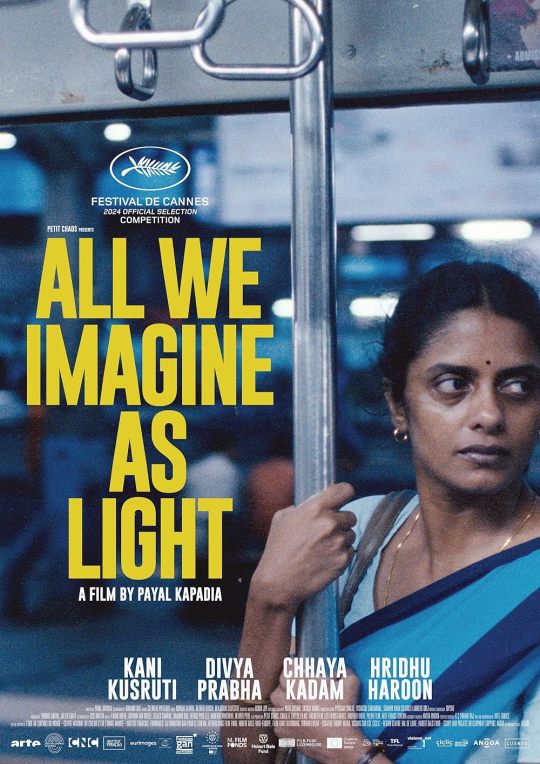
As the first Indian feature invited to compete at Cannes in nearly three decades, Payal Kapadia’s narrative début (after her 2021 documentary, “A Night of Knowing Nothing”) would be notable enough; that the movie is so delicately felt and sensuously textured is cause for outright celebration. Winner of the festival’s Grand Prix, or second place, it tells the story of two roommates, Prabha (Kani Kusruti) and Anu (Divya Prabha), who work as nurses at a Mumbai hospital. It teases out their personal circumstances—Prabha’s estrangement from her unseen husband, Anu’s frowned-upon romance with a young Muslim man (Hridhu Haroon)—with a quiet truthfulness that, like the glittering lights of the city, lingers expansively in the memory. (A forthcoming Sideshow/Janus Films release.)
3. “Grand Tour”

The Portuguese director Miguel Gomes (“Tabu,” “Arabian Nights”) delivered some of the most virtuosic filmmaking in the competition—as the jury recognized by giving him the Best Director prize—with this characteristically yet extraordinarily playful colonial-era travelogue. Shifting between color and black-and-white, set in 1917 but full of fourth-wall-breaking anachronisms, the movie tells a story of sorts about a roving British diplomat (Gonçalo Waddington) and a fiancée (Crista Alfaiate) he’s in no hurry to marry. But its true fascination lies in the humid atmosphere and wanderlust-inspiring splendor of its East and Southeast Asian locations, ranging from Singapore and Bangkok to Shanghai and Rangoon. It’s a movie to get lost in.
4. “The Seed of the Sacred Fig”
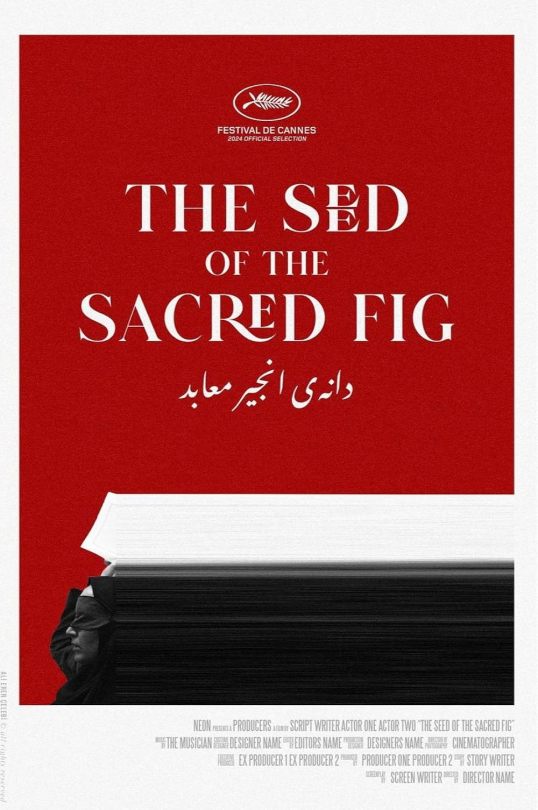
It’s impossible to absorb this blistering domestic drama without thinking of its dissident director, Mohammad Rasoulof, who recently fled Iran after being sentenced to prison and a flogging. (His appearance at his film’s première made for one of the most emotional moments in recent Cannes memory.) Shot entirely in secret, the story follows a Tehran-based husband (Missagh Zareh) and wife (Soheila Golestani) who are increasingly at war with their progressive-minded young-adult daughters (Mahsa Rostami, Setareh Maleki) during nationwide political protests led by women. The result is a thriller of propulsive skill and blunt emotional force, marrying the muscularity of an action film to the psychological intensity of a chamber drama. (A forthcoming Neon release.)
5. “Anora”

The director Sean Baker is near the height of his storytelling powers with this dazzling (and now Palme d’Or-winning) portrait of a Manhattan strip-club dancer (a revelatory Mikey Madison) who impulsively marries the ultra-spoiled son (Mark Eydelshteyn) of a Russian oligarch. Much comic chaos ensues, some of it pushed past the brink of plausibility, but Baker’s multifaceted love for his characters proves infectious and sustaining, as does his belief that acts of unexpected kindness can redeem even the darkest nights of the soul. (A forthcoming Neon release.)
6. “The Shrouds”
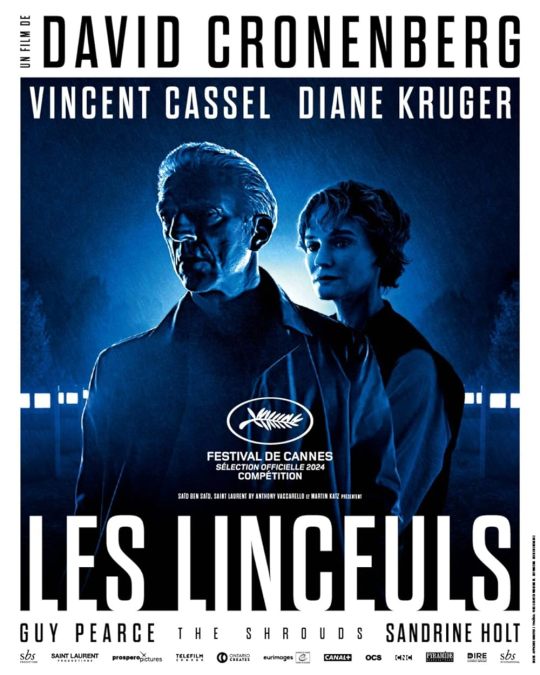
Early on in this elegantly sombre yet mordantly funny new movie, which stars Vincent Cassel, Diane Kruger, and Guy Pearce, the director David Cronenberg, a master of cerebral horror, unveils his latest invention: a technologically advanced burial shroud that allows people to watch a loved one’s body decomposing in the grave. So begins a drolly fluid inspection of classic Cronenberg themes—the deterioration of the flesh, the instability of the image, the paranoia-inducing incursions of technology into every aspect of life—but imbued with a nakedly personal dimension that the director has noted in interviews; the story was inspired by his wife’s death, in 2017, from cancer.
7. “Megalopolis”
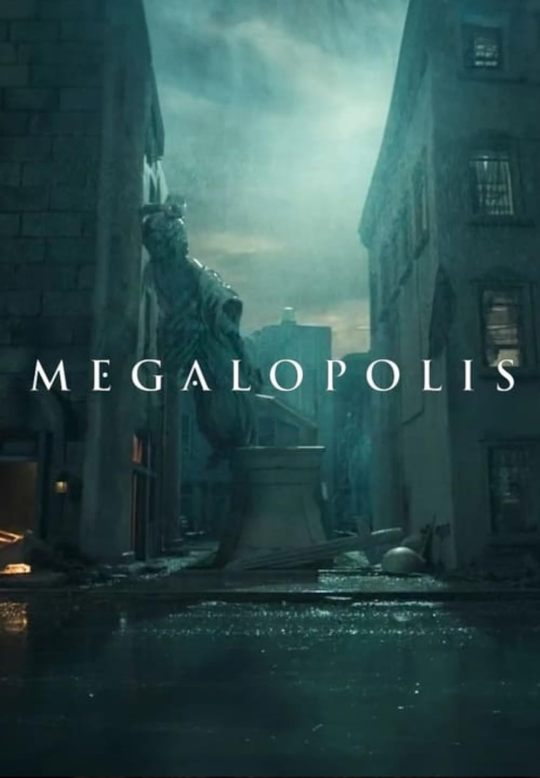
In this legendarily long-gestating passion project, which I’ve written about at length, Francis Ford Coppola posits that our fragile, battered civilization is headed the way of the Roman Empire. The grimness of that prospect is unsurprising from a director accustomed to peering deep into the heart of American darkness (the “Godfather” movies, “The Conversation,” “Apocalypse Now”). For all that, the filmmaking here glows with a particularly hard-won optimism, even a welcome sense of play—borne out by an ensemble of actors, including Adam Driver, Giancarlo Esposito, and especially Aubrey Plaza, who fully embrace Coppola’s rhetorical and conceptual flights of fancy.
8. “The Substance”
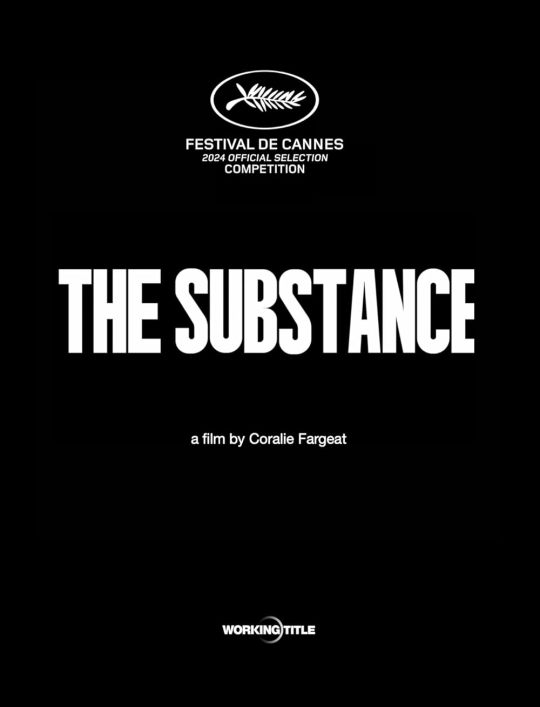
Sympathetic or sadistic? Feminist or misogynist? Coralie Fargeat’s body-horror bonanza, which won the festival’s award for Best Screenplay, has been one of the competition’s more polarizing hits, which is unsurprising; divisiveness should be expected from a story about an aging actress and TV fitness guru who, desperate to regain her youthful bod of yesteryear, effectively splits herself in two. Whether the outlandish premise (think “The Picture of Dorian Gray” by way of “Death Becomes Her”) and its blood-gushing fallout withstand intellectual scrutiny, there’s no doubting the ferocity of the two leads, Demi Moore and Margaret Qualley, or Fargeat’s sheer filmmaking verve as she pushes her ideas to their sanguinary conclusions.
9. “Motel Destino”
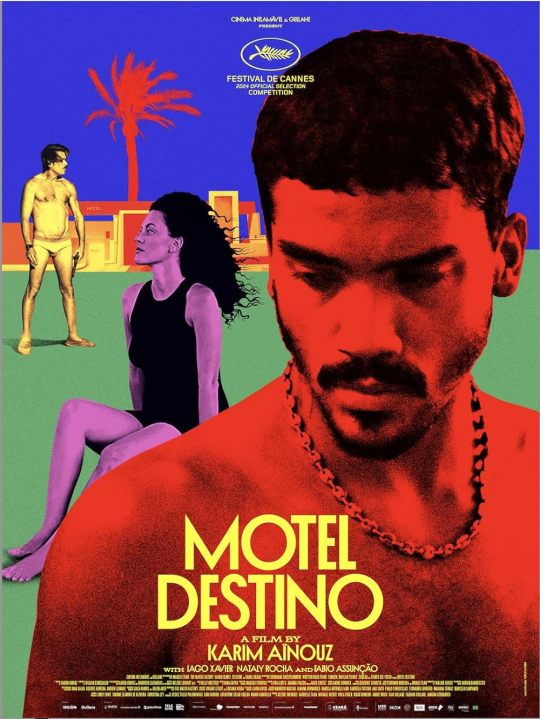
Just a year after the Brazilian director Karim Aïnouz appeared in competition with a surprisingly stiff-corseted English period drama, “Firebrand,” it was bracing to watch him rebound with the competition’s most sexually uninhibited and flagrantly horny title; corsets don’t apply here, and even underwear proves blissfully optional. Set at a seedy roadside motel where the clientele never stops moaning, it’s a feverishly shambling erotic thriller starring three very game actors (Iago Xavier, Nataly Rocha, and Fábio Assunção) in a romantic triangle that plays like James M. Cain with sex toys—“The Postman Always Cock Rings Twice,” as it were.
10. “Emilia Pérez”
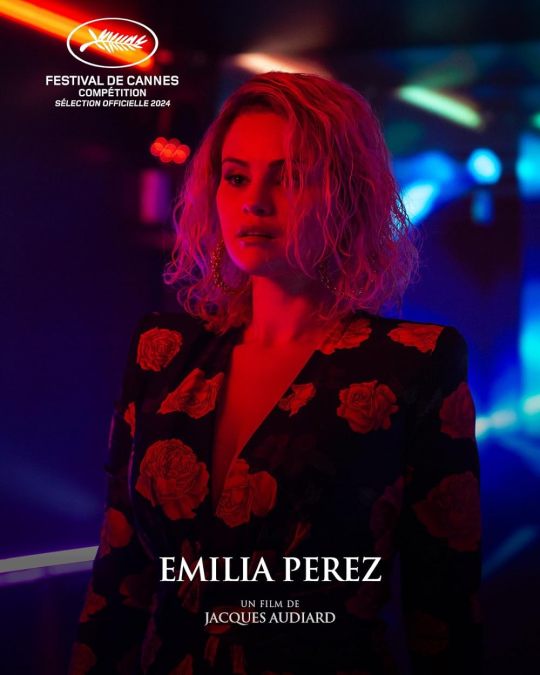
A trans-empowerment musical set against the backdrop of Mexico’s drug cartels might sound like a dubious proposition on paper, and, for the many detractors of this genre-melding big swing from the French director Jacques Audiard (“A Prophet,” “The Sisters Brothers”), what actually made it onto the screen was no better. But I was disarmed from the start by Audiard’s quasi-Almodóvarian vibes, his touchingly imperfect embrace of song-and-dance stylization, and, most of all, his three leads: the remarkable discovery Karla Sofía Gascón, a scene-stealing Selena Gomez, and a never-better Zoe Saldaña. All three (along with Adriana Paz) were recognized with the festival’s Best Actress prize, awarded collectively to the movie’s ensemble of actresses; Audiard also won the Jury Prize. (A forthcoming Netflix release.)
11. “Oh, Canada”
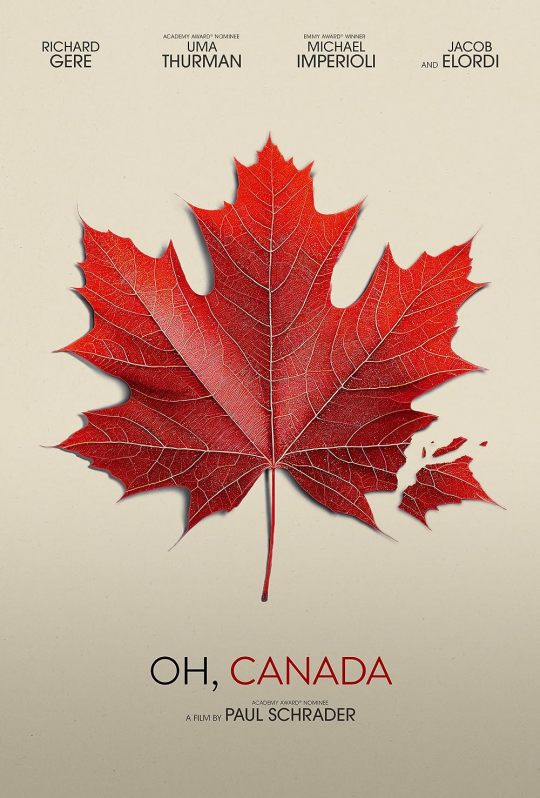
After a tense trilogy of dramas about male redemption through violence (“First Reformed,” “The Card Counter,” “Master Gardener”), the writer and director Paul Schrader has taken a gentler turn with an adaptation of “Foregone,” a 2021 novel by the late Russell Banks. (It’s his second Banks adaptation, after the 1997 drama “Affliction.”) In exploring the fragmented consciousness of an aging documentary filmmaker (played at different ages by Richard Gere and Jacob Elordi), Schrader bravely forsakes the narrative fastidiousness of his recent work and takes on grand themes of memory, mortality, and artistic self-reckoning, to formally ragged but sincerely moving effect.
12. “The Girl with the Needle”
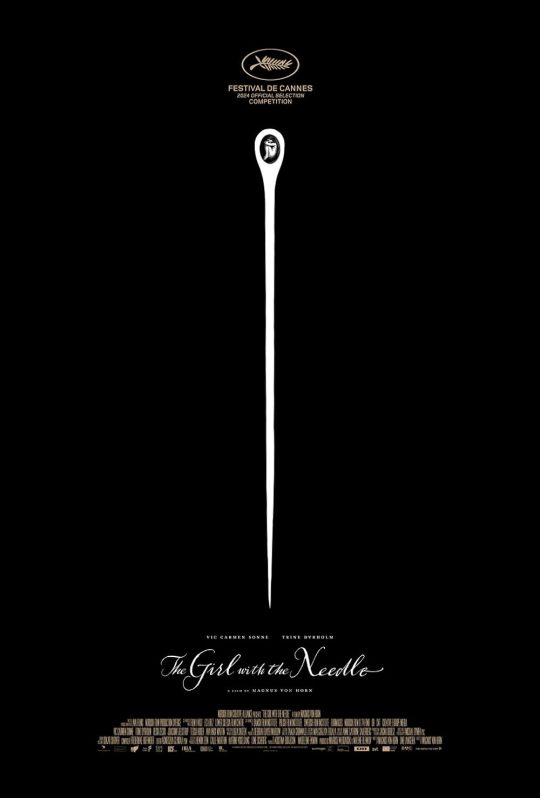
This stark and terrifying black-and-white drama from the Swedish-born, Polish-based director Magnus von Horn (“Sweat”) was perhaps the competition’s bleakest entry. Set in Copenhagen immediately after the First World War, it pins us so mercilessly to the hard-bitten perspective of Karoline (an excellent Vic Carmen Sonne), a factory seamstress who becomes pregnant out of wedlock, that we scarcely notice her story shifting in a different, more sinister direction. It’s a bitterly hard-to-stomach brew of a movie, at once hideous and beautifully made, with a chilling supporting turn by Trine Dyrholm as a friend whose interventions turn out to be anything but benign.
13. “Three Kilometres to the End of the World”
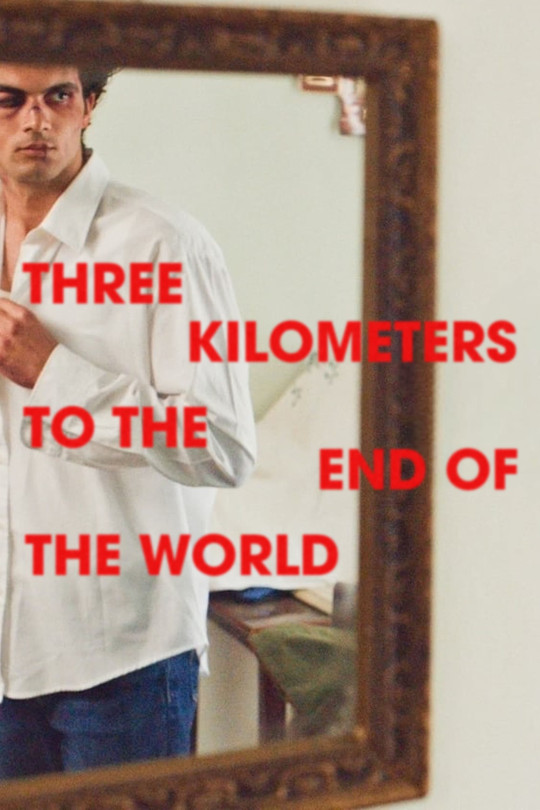
The setting of this well-observed but emotionally opaque drama, from the Romanian actor turned director Emanuel Pârvu, is a small rural village where a closeted teen-age boy, Adi (Ciprian Chiujdea), is brutally beaten after being caught in an intimate moment with a male traveller. Pârvu teases out the legal, psychological, and moral fallout with the pitch-perfect performances and laserlike formal focus that have become hallmarks of new Romanian cinema. But, though the movie is persuasive enough as an indictment of small-town religious fundamentalism and homophobia, it proves curiously incurious about Adi’s perspective, to the detriment of its own human pulse.
14. “Kinds of Kindness”
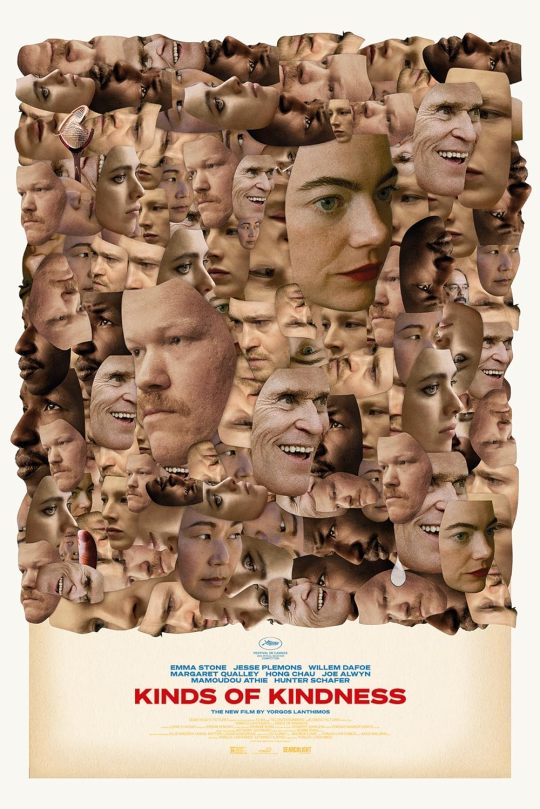
After his Oscar-winning period romps “The Favourite” (2018) and “Poor Things” (2023), the Greek director Yorgos Lanthimos scales back—but goes long—with a sprawling, increasingly tedious compendium of comic cruelty. My favorite of the film’s three disconnected stories, all featuring the same actors, is the one where Jesse Plemons (the ensemble M.V.P., as the jury recognized with its Best Actor award) plays Willem Dafoe’s Manchurian candidate; my least favorite is the one where Emma Stone joins a sweat-worshipping sex cult. The one where Stone slices off her finger and cooks it for Plemons falls—much like the movie in Lanthimos’s over-all œuvre—somewhere in the middle. (A Searchlight Pictures release, opening June 21st in theatres.)
15. “Bird”
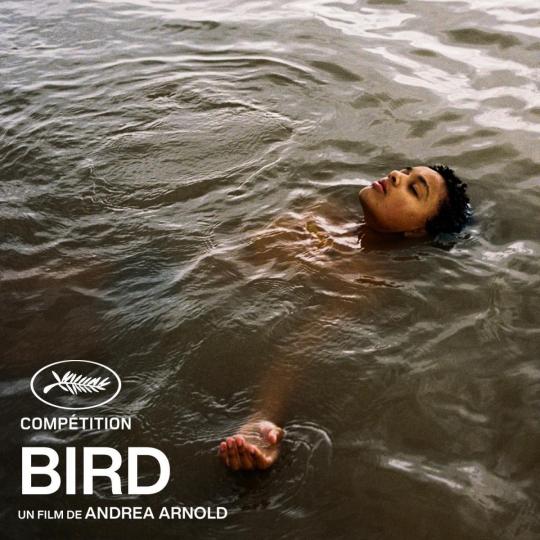
My admiration for the English filmmaker Andrea Arnold (“American Honey”) is such that I’m eager to revisit her latest rough-and-tumble coming-of-age story and find that I undervalued it. Arnold is certainly skilled at integrating recognizable actors, which in this case includes Barry Keoghan and Franz Rogowski, into her grottily realist frames, and she has an appealing lead performer in Nykiya Adams, as a twelve-year-old girl who overcomes persistent abuse and neglect. But the story may lose you—as it lost me—with a magical-realist turn that magnifies, rather than minimizes, the tortured-animal symbolism that has often dogged Arnold’s work.
16. “Beating Hearts”
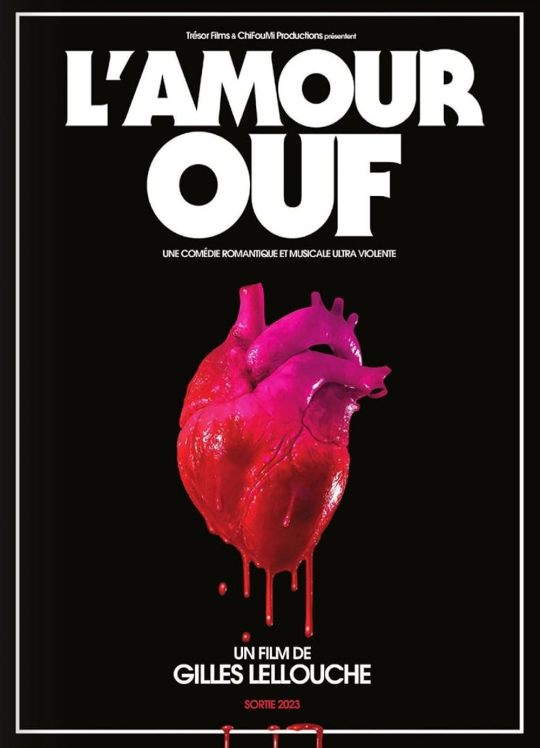
An exchange of insults at a high-school bus stop provides a saucy meet-cute for a good girl (Mallory Wanecque) and a ne’er-do-well boy (Malik Frikah); so begins a raucous and endearing love story for the ages, in which the director Gilles Lellouche, with outsized glee and little discipline, merrily appropriates the conventions of classic Hollywood musicals and gangster flicks. The result is much too long at nearly three hours—the story spans several years, with Adèle Exarchopoulos and François Civil playing older versions of the two leads—but I can’t say I didn’t warm to its rambunctious cornball charm.
17. “Limonov: The Ballad”
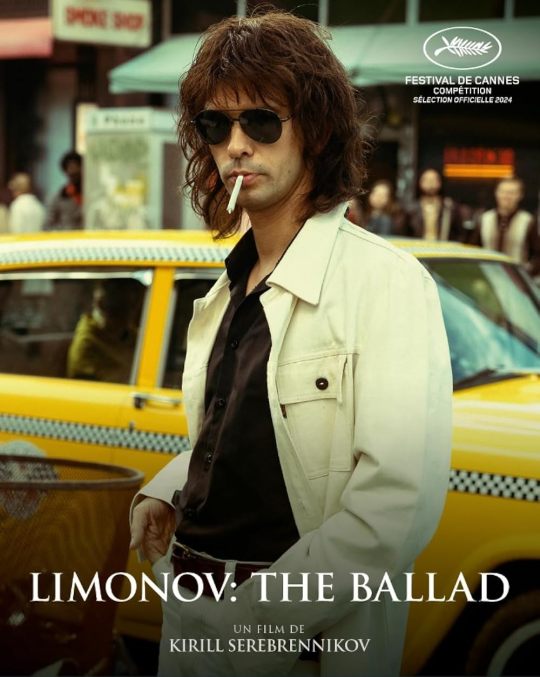
Why make a film about Eduard Limonov, the globe-trotting Russian dissident poet and punk provocateur reviled for his pro-fascist sympathies? The filmmaker Kirill Serebrennikov never musters a satisfying answer in this muddled English-language bio-pic, despite an energetically uninhibited central performance by Ben Whishaw and a cheeky panoply of filmmaking techniques—jittery camerawork, lengthy tracking shots—meant to catch us up in the épater-la-bourgeoisie exuberance of Limonov’s revolt. Considering his earlier work, I prefer the rebel-youth vibes of “Leto” (2018) and the dazzling cinematic assaults of “Petrov’s Flu” (2021), both of which also screened in competition here.
18. “Parthenope”
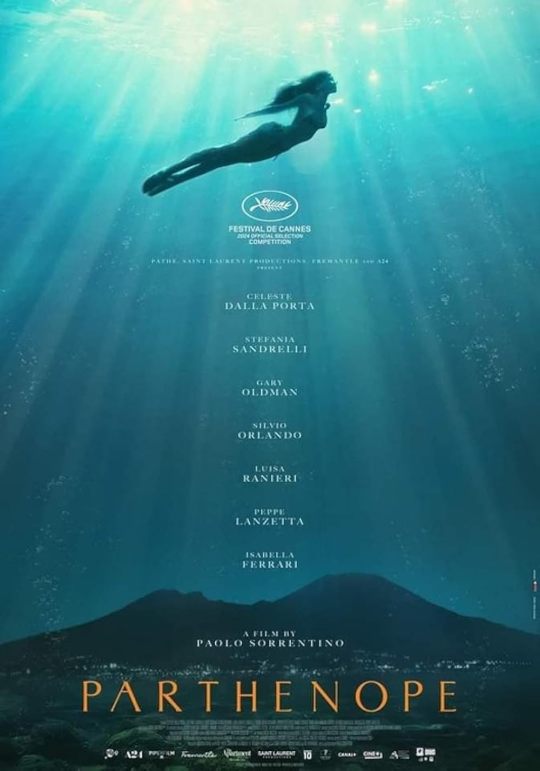
Nearly every new picture from the Italian auteur Paolo Sorrentino could be reasonably called “The Great Beauty,” the title of his gorgeous 2013 cinematic tour of Rome. (It left that year’s Cannes empty-handed, but won the Oscar for Best Foreign Language Film.) His latest work remains most intriguing for its ambivalent but still sensually overpowering vision of the director’s home town, Naples, from which springs a modern-day goddess, named after Parthenope, a Siren from Greek mythology. She’s played by Celeste Dalla Porta, a great beauty indeed and an empathetic screen presence, though only fitfully does her character seem worthy of this movie’s epic enshrinement.
19. “Wild Diamond”
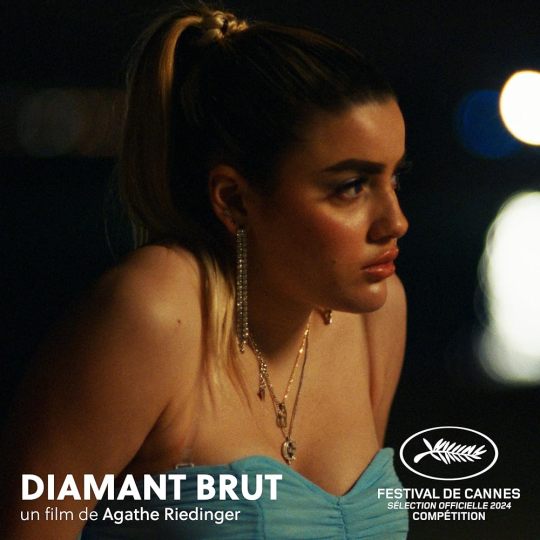
Another disquisition on beauty and its discontents, this time from the débuting French writer and director Agathe Riedinger. She hurls us the life and busy social-media feed of a nineteen-year-old, Liane (a terrific Malou Khebizi), who has nipped, tucked, and tailored every part of herself to realize her dream of being selected for a hot new reality-TV series. Part influencer-culture cautionary tale, part bad-girl Cinderella story, the movie glancingly suggests the soul-rotting effects of beauty worship, but it falls victim to the trap that Liane is trying to avoid: in a sea of worthy candidates, it doesn’t especially stand out.
20. “The Apprentice”
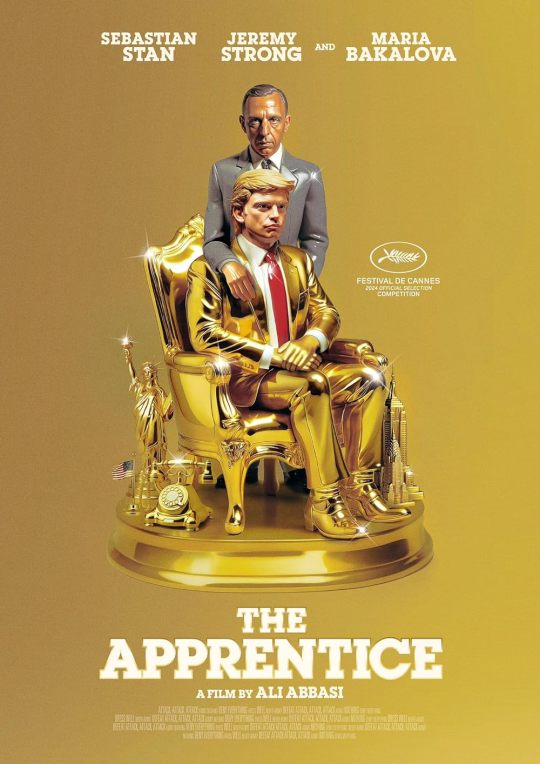
Donald Trump’s attorneys have threatened legal action to block the release of this drama about his early rise to fame and wealth under the mentorship of the attorney Roy Cohn (Jeremy Strong). It speaks to the useless proficiency of Ali Abbasi’s movie that the prospect of such censorship provokes more indifference than outrage. Shot to evoke cruddy nineteen-eighties VHS playback, the movie is well acted by Strong, Maria Bakalova as Ivana Trump, and an increasingly makeup-buried Sebastian Stan as Trump himself, depicted from the start as a sack of shit that gets progressively shittier. It’s not dismissible, but it’s hardly the stuff of revelation, either.
21. “Marcello Mio”
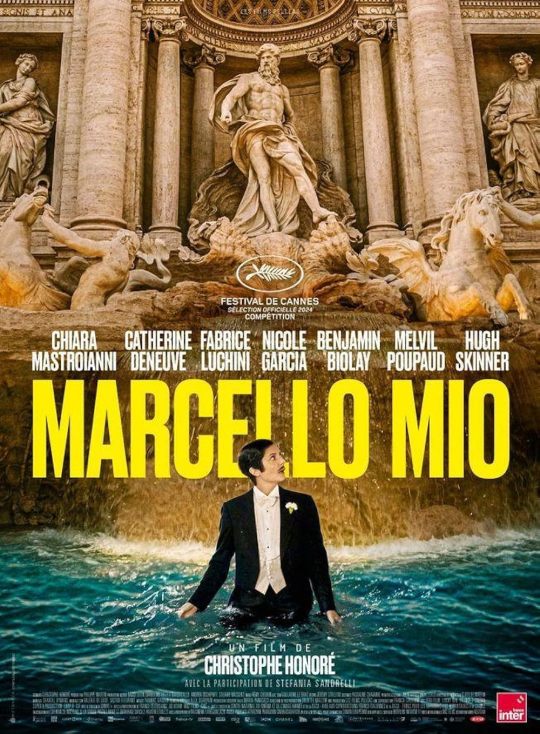
In this trifling meta-comedy from the French filmmaker Christophe Honoré (previously in the 2018 Cannes competition with the lovely “Sorry Angel”), the actress Chiara Mastroianni embarks on a strainedly whimsical personal odyssey to examine the legacy of her late father, the legendary Italian actor Marcello Mastroianni, and her own conflicted place therein. To that end, she spends much of this overstretched movie in “8½” and “La Dolce Vita” black-suited drag as she navigates a roundelay of industry in-jokes; among the French cinema luminaries making appearances are Fabrice Luchini, Nicole Garcia, and, most welcome, Chiara’s mother, Catherine Deneuve.
22. “The Most Precious of Cargoes”
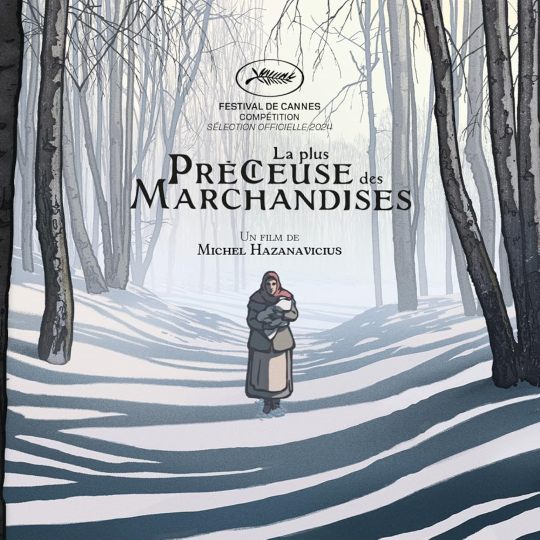
The French director Michel Hazanavicius continues his uneven post-“The Artist” run with this animated Second World War fable, adapted from a 2019 novel by Jean-Claude Grumberg (and narrated by the late Jean-Louis Trintignant). It has an affecting opening stretch, in which a baby girl, thrown by her desperate father from an Auschwitz-bound train, is rescued and raised in secret by a woodcutter’s kindhearted wife. But when the child’s provenance is discovered, stoking local antisemitism, the movie becomes a bathetic wallow in Holocaust imagery, drowned in an Alexandre Desplat score whose every surge turned my heart increasingly to stone. ♦
#Cannes Film Festival#Cannes Film Festival 2024#Youtube#Caught by the Tides#All We Imagine as Light#Grand Tour#The Seed of the Sacred Fig#Anora#The Shrouds#Megalopolis#The Substance#Motel Destino#Emilia Pérez#Oh Canada#The Girl with the Needle#Three Kilometres to the End of the World#Kinds of Kindness#Bird#Beating Hearts#Limonov: The Ballad#Parthenope#Wild Diamond#The Apprentice#Marcello Mio#The Most Precious of Cargoes
105 notes
·
View notes
Text
asoue au: gregor doesn't exist.
hector and ike anwhistle joked when they were little about their imaginary older brother name gregor. they picked gregor because it works with their naming scheme: g-h-i. they gave gregor the interest of fossils (mainly trace fossils) and of mycology. they gave him an unpredictable personality; one moment he can be a bully to them, the next moment he's their best friend in the world.
after they got recruited, they joked to other neophytes one day about how their older brother never got recruited properly due to being away at a boarding school in the middle of the hinterlands and is more or less exempted from the training they went through.
only one person got the joke, remembering it was april fools day. so everyone in their generation sincerely believes that gregor anwhistle exists. hector and ike being kids at the time, continue the joke. they show letters gregor wrote them and gifts he sent them. in reality hector wrote them in a messier handwriting style so no one traces it back to him, and ike used his allowance to buy items that gregor would send the two they would like or of gregor's own interests.
(beatrice being around the same age as her second cousins, accept the idea that gregor is an anwhistle she never met, for she doesn't visits the anwhistles that often per-recruitment; though once in awhile beatrice thinks otherwise. jacques and kit are more certain on the idea that gregor doesn't exist, but memory is a funny thing; they want to give the benefit of the doubt that they met gregor once but forgotten him after he went to boarding school.)
when their associates decided that they need to meet gregor properly, hector and ike and realize maybe the joke is going far. but they didn't stop, instead of taking steps to delay said proper meeting, saying that gregor is very busy, but he would try to contact them through means that isn't letters. hector called in phone booths, or made recordings in a deeper voice than usual, with an accent that their father uses. ike took photos of himself in elevated shoes (for gregor is 'taller' than hector and ike) from behind, or obscure his face by any means possible, in clothes that ike (and hector) would never wear.
the joke nearly blew up in their face, when beatrice, kit, and jacques ran into ike, scouting a location for another photo shoot. the three pushed ike to introduce gregor. luckily for ike, it was evening and hector was around; hector put on his gregor voice and the gregor shoes and clothes to become gregor; hector also wore a mask around his face, the excuse being to lower the chance of getting sick.
and the three bought it completely. their meeting of gregor spread to their other associates (sans josephine; she was the one who got the joke back then, and while she didn't support hector and ike continuous joking, didn't stop them either). soon, the others were meeting gregor in the same circumstances: in the evening, with gregor wearing a mask with ike or hector present (on occasion ike takes over to avoid suspicions, though he talks very little due to poorly copying hector's gregor voice and thus tries not to let anyone know).
the visits were heard by their parents, as well as other older volunteers. with the joke now known to older generation, hector and ike feared the lecture of the century, as well the order of telling everyone the truth.
but as it turns out, they couldn't.
their parents and the others older volunteers learned someone in their generation created a plan. a dangerous plan to stop the other side, and end the schism after all. their plan? create a deadly fungus.
and mycology is after all, an interest of gregor.
so the joke continued on, much to hector and ike's dismay. they didn't like gregor being the figurehead of the project with other scientists working with him, with beatrice and bertrand joining in later in creating the antidote. they didn't like how gregor became more unpredictable, wanting the project to succeed despite it being so dangerous that kit wrote to gregor to warn him with a thin threat in her letter.
it's a letter hector tried to response too, but he never got past drafts of letters and scripts to make a recording on or make as a proper phone call. it's a letter ike tried to response too in person, but he could never face kit when in his gregor clothes and shoes.
both hector and ike felt that maybe things would be better if gregor was better off dead.
so imagine their surprise and horror when anwhistle aquatic was burnt to the ground, with all but one body being account for: gregor. as such, during gregor's funeral, there was no casket to be bury. just a blurry photo of him from behind shown.
hector and ike after leaving the funeral, thought they could finally be a peace. both are now away from the city; hector is now living in the village of fowl devotee, while ike is married to josephine at last and lives over lake lachrymose with her in a house that is theirs.
but they aren't at peace. the guilt of their joke having a life on its own, a life that was killed by outsiders, haunts them. both hector and ike wonder at times if karma, if it exists, will get to them.
(ike being the first brother to go by the leeches as hector thinking maybe.)
(hector's not-so-chance reunion with kit and widdershins out at sea has hector thinking very likely)
(hector's no-way-in-hell survival of the great unknown has hector thinking yes, especially when considering who he survived with.)
#asoue#a series of unfortunate events#asoue au#gregor anwhistle#ike anwhistle#hector asoue#hector#ramblings#gregor doesn't exist au#(hector is not going to have a good time post canon in the au)#(tfw you're with your brother's killer but said brother never existed he was you and your real brother all this time)
16 notes
·
View notes
Note
something interesting that popped into my head re: maiden talk. objectively between winter, weiss, and jaune, winter is the one most committed to atlas the nation; her line to ironwood, "I have never wavered in fighting the enemies of this kingdom, and I won't start now" has always stood out to me and I find it... interesting. Winter has the winter maiden powers and is probably the most high-ranking Atlas official to survive the fall. Raven, in committing to her tribe, places herself squarely in Mistral. Cinder steals Amber's powers in Vale, a country historically against Atlas (notably in the Great War), therefore aligning with her own sentiments. I doubt there is actually anything to this, but it feels like more reason to believe the Summer maiden will be in and associated with Vacuo. also as I rewatch the ironwood fight, he says that he never expected Winter to betray him... I have to wonder if he groomed Winter into joining the Atlesian military, or planted the seed in her mind, thinking that if he could mold someone into the lieutenant he needed that he'd never have to worry because he would have been totally responsible for them. (as in, taught them everything and shaped their morals and scruples). we know that as head of atlas he is the headmaster of the atlas academy but what better way to make sure that your protege never gets any "ideas" by picking someone who is isolated and desperate to escape, who wants to be cared for and about by someone and especially someone like him? if they never go to the academy they won't have the distraction of "friends" and "teams" and "allegiances." this could in part explain why her sword and rapier (?) are like ironwood's bfg and due process- she modelled them after him. also of course must be mentioned that when James realized Winter had inherited the maiden powers, he says that the destiny he chose for her had arrived. he must have known that it means penny is dead, but that doesn't matter to him at all. i think that's part of why winter is so pissed when she says "you chose nothing. this was a gift." she has to grieve her friend and a man who stands before her claiming he feels betrayed doesn't even seem surprised or sad about the death.
…hm yeah. throws that on the "gillian asturias is the summer maiden" pile
the WOR episode on huntsmen implies this pretty overtly, as ozpin notes that atlas academy has been under increasing scrutiny for "indoctrinating" its students into the military and pressuring graduates to enlist as special operatives, and…
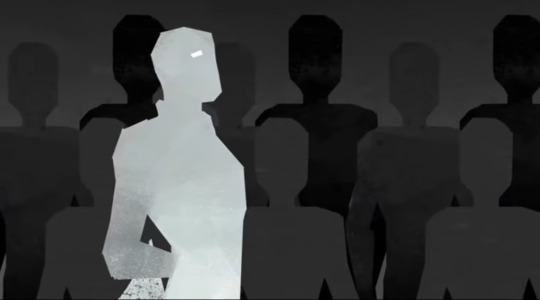

ironwood also personally invites weiss to enroll at atlas in V4, and he knows jacques personally--prior to the fall of beacon it's implied they were political allies even, so he certainly knows what kind of person jacques is and how he treats his children. and then the way he talks to the kids when he gives them their licenses in V7 implies an expectation of personal loyalty--he needs huntsmen he can trust at his side.
i think he probably saw it as himself opening doors and taking a personal interest in promising students, much as ozpin does--bc ironwood very much does view himself as ozpin's most important lieutenant and natural successor, based on his unilateral actions after the fall--without necessarily recognizing (or caring) how manipulative and exploitative this sort of behavior is. but 100%, absolutely he was surprised by winter's "betrayal" because he thought she was his perfect protégé, never realizing she could still think for herself.
the funny thing is, projecting absolute obedience and deference while keeping her true thoughts and feelings behind a faultless mask is almost certainly a survival skill winter learned to protect herself from jacques, and she slips seamlessly into doing that the instant ironwood begins to make choices she disagrees with.
ditto her decisions in V8: winter sees ironwood murder a councilman in cold blood, going past "martial law" all the way to "military coup," and she sees the ace-ops brace up and fall in line. so what does she do? quietly stays put and starts doing what she can to sabotage him. she lets JYR go, then--upon realizing that they must have been the ones to blow up the whale, and thus probably survived--immediately turns around and declares they're going back to ironwood, no searching for the hostages, they'll tell him something else blew up the whale in person. jumping in to "arrest" marrow before ironwood shot him wasn't the moment winter "came to her senses"--that happened when she saw ironwood shoot sleet. it was just the moment when she saw she could do more good by leaving than by staying to mitigate ironwood's excesses. & i would bet anything that is exactly how winter was with her siblings when they were children: appeasing jacques and presenting as the perfect obedient child, and using the relative freedom that gave her to make things easier for her siblings in small, quiet ways.
ironwood just never noticed that he'd burned through all of winter's trust and all the chances she was willing to give him.
as for his reaction to penny's death: another moment i think about fucking constantly is this:

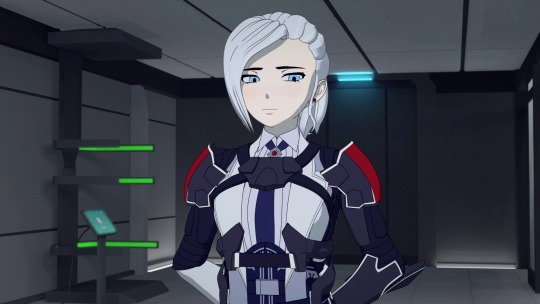
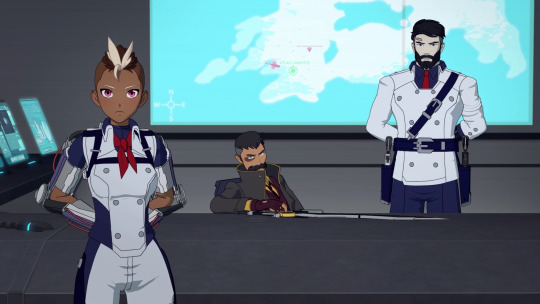
the way her focus goes right to penny's sword. the pause before she responds "sir?" to ironwood's greeting because she's so caught up in her worry for penny. (watts being… watts, and silently gloating at her because he can tell how bothered she is. framed between ironwood and harriet, who don't see penny as anything but a weapon to get under control.)
there's a reason winter is such a storm of feelings when she lets JYR go to try to save their friend, and the reason is she's terrified and angry and disgusted by whatever ironwood did to penny while she was being fitted into that brace, unable to intervene or protest.
so a day later, when penny dies and ironwood shrugs? it's not just that he's indifferent. ironwood is directly responsible for penny's death--he made the devil's bargain with watts, he authorized that virus, he is the reason penny was forced to leave her robotic body behind, he made penny vulnerable to cinder--and winter knows that.
34 notes
·
View notes
Text
i am once again rewatching rwby.
RED TRAILER.
45s in i have to pause to yell (again) about “thus kindly i scatter”—THE SPEAKER. SUMMER ROSE IS NOT THE ROSE. SHE IS THE SPEAKER WHO KILLS THE ROSE AS A CONTEMPLATION OF HIS OWN MORTALITY IN THIS ESSAY I WILL–
“soon may i follow/when friendships decay/and from love’s shining circle/the gems drop away/when true hearts lie withered/and fond ones are flown/oh! who would inhabit/this bleak world alone?” the moon will sadly watch the roses die, huh.
lol.
lmao even.
i know it was just because the budget was a shoelace and chewing gum at this point but the grimm here being fully black with no plating is really funny in the context of my worldbuilding. because it means ruby just fucking slaughters a bunch of baby grimm bfrghfk
WHITE TRAILER
atlas is full of the worst kind of person (people who do flash photography in theaters)
it really is bonkers that jacques was like. yeah i won’t let you attend your college of choice unless you defeat this huge old geist that i have arranged to be captured and inserted into one of our comically oversized suits of armor. sir,
how did they even CATCH that thing.
this is probably my favorite of the trailers in all honesty. the duality of her public/private lives on such raw display. & i think the fight choreo is the cleanest.
the moon does not look broken so much as it looks like something has been nibbling on it. zhan tiri behavior.
BLACK TRAILER
i love how the thinking behind forever fall forest was clearly just “we cannot have green trees in this trailer it’ll ruin the whole aesthetic.” brhdjgh
YOUR HOPES HAVE BECOME MY BURDEN. I WILL FIND MY OWN LIBERATION. salem foreshadowing dot txt.
mumbles. V2 heavily implies that ozpin thinks blake is salem’s spy. so it is not inconceivable that that crow might in fact be qrow. i think about this often.
i have to imagine that this unbelievably over the top security robot was there because somebody tipped off the SDC as to the robbery plot. because lmao.
YELLOW TRAILER
“scathing eyes ask that we be symmetrical” this counts as arm foreshadowing tm
raven being here at the beginning really makes this. somehow a more attentive parent than tai BRGRHFKF (for legal reasons this is a joke)
ozma like yeah in my ideal society there is a minuscule class of elite special warriors with superpowers who roam around unrestrained by law or regulation and with zero meaningful oversight besides their own guild. & then there’s everybody else. why isn’t humanity united yet
i love them so much. they’re so stupid BRRHDKVJDNV
yang’s introduction vs the other three is really so hysterical though. she just- she swans into a nightclub and hospitalizes like fifty people HRGKH. she’s SEVENTEEN.
girl,,
junior and oobleck have the same basic weapon. oobleck’s is also a thermos, befitting his status as a hyper-caffeinated eccentric historian. junior runs a nightclub. do we think he can drink booze out of his
why is tai letting his fifteen year old wander around in the industrial district after dark 😭 man WHAT are ya doin
EP 1: RUBY ROSE
salem: humankind is wise, strong, resourceful, passionate, ingenious, did i mention resourceful? all it took for them to defy fate itself and flourish against all odds was a single spark of hope <3 …what was i talking about? oh, right. oz, your terror of change and your reliance on isolated guardians to hold up the rotting façade of your precious academies will be your undoing because there is no victory to be found in strength. fuck you.
oz: but perhaps!! victory is found in the simpler things that you’ve long forgotten. like hope and honesty <3
salem: ………really?
they are so. DIVORCED. AJDHSHDK
“so-called free world.” her protégée was a child slave. her protégée was a child slave whose mentor attempted to arrest her after she murdered her owners. slavery was abolished after the great war. your so-called free world.
shes so ANGRY.
“a smaller, more honest soul” says the LIAR LMAO
ruby: i think today i will murder some goons <3
ozpin pretending like he doesn’t know exactly who ruby is. most hysterical play of all time. it’s clearly not a secret he’s keeping for a reason—otherwise qrow wouldn’t have been so loose with telling the girls he’s tight with ozpin and ironwood later on—so like. ozpin are you just lying to this girl out of HABIT (probably)
“i want to be a huntress”/“you want to slay monsters?” -> “and what exactly does a huntress do?” “fight… monsters, i guess?” SCREAM LAUGHS.
glynda is like “he’s going to let this child into the school. gods help me” she does NOT get paid enough. whatever he’s paying her isn’t enough
ruby: i don’t want anyone to think i’m special or anything :(
ozpin: good news everybody—
“our world is experiencing an incredible time of peace! please do not ask why we need to train warriors to uphold this peace, thank you :)” cult behavior
the !!empty!! cloak floating above summer’s grave… she’s so alive it makes me crazy
“i don’t want to hear your absolution/hope you’re ready for a revolution” SCREAM LAUGHS AGAIN.
#WRAPPED UP IN A LIE ( ooc. )#liveblog tag.#[ V1 is so fun.#insane rewatch value.#all the foreshadowing hits like a truck hrgdksgf ]
3 notes
·
View notes
Text
Weiss's rapier clattered along the metal floor as she was knocked away. The White Fang brute stalked closer, revving his chainsaw in no doubt a sick, twisted delight in seeing her cower. She edged further away, but then hit the door. Cornered with Myrtenaster out of reach, she did the one thing she had left she could do.
"DADDY!"
Weiss sobbed, fountains of tears pouring down her face as she wailed. The brute laughed, stopping to catch his breath. He stepped forward, his fanged maw wide with glee.
"Jacques Schnee's blood money can't save you this time." He raised his chainsaw high, ready to deal the killing blow. Suddenly, he doubled over as a horrible screeching sound erupted behind him. Turning, he saw the door to the subway car bend and buckle under great force as a hand tore it open.
Once open wide enough, a young man stepped. He had blonde hair and was wearing a white breastplate over his chest. His blue eyes were wild with fury.
"Who the hell are you?"
"I was about to ask you the same thing!" The intruder responded.
"Daddy!" Weiss cheered. The brute turned to her, making her flinch. "Daddy, help me!"
"Is this a joke?" The brute laughed. "Because it's hilarious! To think the Schnee heiress would whore herself to a scrawny twig of a human!"
The young man began stepping forward, his shoes hitting the metal floor with rage. The joke no longer funny, the brute swung at the human. Faster than he seemed, the brute missed and swung again.
The young man got into the brute's guard and slammed his forearm, halfway to his elbow, into the brute's abdomen. Retching, the brute staggered, but was unable to retaliate as his arm was broken, forcing him to drop his chainsaw.
As the brute fell to his knees, screaming, he looked up to see the baneful eyes of the young man, before his fist cracked into his mask.
"Are you okay, pumpkin?" Jaune asked tenderly as he wiped her cheek.
"Y-Yeah, I'm okay, Daddy." She replied with a smile.
"Good. Where are your sisters?"
"They're right behind me. They're trying to stop the train."
Looking outside, Jaune understood the situation. He nodded, then helped her up. "Okay, get Myrtenaster and help your sisters. I'm stopping the train."
"Okay, Daddy. I love you."
Jaune chuckled and tousled her hair. "I love you, too, Pumpkin. Now get going."
Yang groaned as she woke up. The last thing she remembered was seeing her mom walk through a portal. Before that was a hazy blur of pain. She opened her eyes to see a familiar face. "Hey, Pops." She croaked.
"Hey, kiddo." Jaune replied. "You enjoy your nap?"
"No." She grunted trying to stand up.
"Woah, woah, easy." Jaune helped her to her feet, then walked her towards the control panel beyond the door. Inside, he set her down in a chair, then began setting to work following the procedures for engaging the emergency brakes. He spoke into the intercom. "Uh, attention, all hands, uh, emergency brakes are about to be set, so, uh, 'set' yourself on down and buckle up!"
Yang chuckled. "That was horrible." As he sat down, he helped her buckle in, before doing so himself. "How are the girls?"
"Your sisters are fine." He answered without looking at her. "Ruby is with Doctor Oobleck, and Weiss and Blake are fighting that Roman guy."
"Are they winning?"
"They will be." He placed a hand on the emergency brake. "This is gonna hurt, though."
Shouting. Roaring. Gunfire. Real fire. It was all a blur to Roman. He groaned as he pulled himself from the rubble of the wreckage. No sign of the catgirl or her white friend, so that was a plus. With the cacophony of battle outside, he could easily slip away. He just had to climb out this hatch and-
"Hi." A pair of hands grabbed Roman and hoisted him up with ease. "You must be Roman." He was sent careening to the ground as heis vision was briefly blurred by pain and a fist. "I've been wanting to meet you for months now! My girls talk a lot about you."
"Girls- What?" Roman asked as he stood up.
"My daughters. My little angels you keep trying to kill."
"No offense, Gramps, but maybe if you taught those brats better, they-" Roman stopped as he saw the blond teenager standing in front of him with his arms crossed and his chest puffed. "Who the hell are you?"
"Jaune Arc, Huntsman-in-Training at Beacon," he answered, "and proud father of 'those brats.' So let me ask you now; who the hell are you?"
Me? Can't you tell?" Roman gestured to himself. "I'm the world's greatest criminal mastermind, Roman Torchwick!"
"You seem more like a thug who's too full of himself."
"Care to test that, Daddy Dearest?" Roman aimed Melodic Cudgel at him. One shot should do it.
"No," he pointed past Roman with a lazy gesture with his index finger, "I know they can do it better than me."
"Don't sell yourself short, Pops!"
"You're more than a match for him, Daddy!"
"We appreciate you letting us do this, though, Father."
"Dad, how far is too far here?"
"You're the heroes, sweetie!" The boy called back. "Do what you think is best!" He then chuckled. "Good luck, Roman, you're going to need it."
"Good night, Ruby." Jaune kissed her forehead, standing on their dresser to reach her top bunk. "Sweet dreams!"
"Good night, Dad." Ruby yawned.
Jaune stepped down, then knelt down to Weiss's bed. He kissed her forehead, then caressed her face. "Are you going to be okay, sweetie? Today was kind of intense."
"I'll be fine, Daddy." Weiss replied.
"Well, if you need me, I'm across the hall. Okay?"
Weiss yawned. "Okay."
Jaune turned around to Blake and Yang's bunks. He climbed the dresser and found Blake reading one of her books. She quickly shut the book and hid it under her pillow.
"Blake," Jaune chuckled, "you can still read your book. Just don't stay up too late."
Blake blushed. "R-Right. I'm sorry, Father." Jaune leaned forward and kissed her forehead. "Good night, Father."
"Good night, Blake. Don't stay up too late." He climbed down and found Yang sitting on the edge of her bed. She had a cheeky look on her face. "What did you do now?"
"What? Can't a girl be happy to see her old man?"
"She can, but when you do, there's something suspicious about it."
"No, no, nothing suspicious!" She then climbed in bed and crawled under her covers. "G'night, Pops!"
"Good night, Yang." He leaned forward, but was met with a pie in the face. She laughed uproariously at the display, Jaune scowling through his whipped cream mask. "Jokes on you, kiddo, I still haven't given you your goodnight kiss!"
"No!" Yang laughed as the two wrestled, his whipped cream face peppering her in white smears all over. When they heard the hissing shush of the other three girls, they settled down. "Good night, Daddy."
Jaune chuckled. "Good night, Princess. I'll see you all in the morning." With that, he left their room to across the hall. Once inside, he found his team all tucked in themselves, but still wide awake.
"Where's our good night kiss?" Nora barked.
"Coming right up, Nora. I just need to wash my face first."
#rwby#weiss schnee#white fang lieutenant#jaune arc#yang xiao long#roman torchwick#blake belladonna#ruby rose#nora valkyrie#lie ren#pyrrha nikos
73 notes
·
View notes
Text
Consolation Prize
Summary: Jacques' super great plan to cheer up Josée after their TDRR loss.
Rating: K+
Warning: Mild cursing
AN: I've been meaning to write this for YEARS, but alas… a funny, evil hah-hah drabble. Wrote on Docs on mobile 😵💫
—
Everyone cheered with congratulations as confetti and sparkles rained down onto the stage—everyone, except for the Ice Dancers. Jacques and Josée both sneered at the Cadets, who were living it up by throwing their newly acquired million dollars into the air to mix in with the confetti.
Jacques hated them. He hated the Surfers. He hated Don. He hated all of the stupide, ugly people here. The only person here that he didn't hate, was Josée. His eyes drifted to the side to check on his partner again, but she was too busy glowering at the back of MacArthur's head to notice.
Stupide MacArthur who saved her life not even a day earlier.
What did she want for it, a medal? It didn't matter that they would have been guaranteed fourth place without her help, it didn't matter that Josée could have… died, without her help. It was still a competition, and she didn't have any right to be all mad at Josée for playing the game as soon as the moment was over.
Jacques huffed. Maybe he was just bitter. This whole damn race was a huge waste of time and a fantastic pain in the butt. He and Josee were so close to total reconciliation back in Montreal, and then they participated in this dumb race. They'd been pushed to their limits, had their absolute worst brought out, and fought with each other so much. And then that fiasco in the Bahamas… Ugh…
"Yes, throw all your money on the ground, very smart." Don chided the Cadets with a host-appropriately peppy side-comment.
Jacques looked to Don, then back to the Cadets two rows ahead of them. Stupide pompous pigs, stupide…
His eyes settled lower, specifically onto the ground between the vegan Mile's sandal-clad feet in front of him. Along with the colorful confetti and some loose bills, a fairly thick clip of hundreds laid there innocently on the floor. Jacques eyebrows raised, mouth dipped low.
Don just finished giving the season outro, and everyone yelled again, save for himself and Josée. No one was looking at him. No one was looking at anything besides the camera at the end of the stage.
Jacques did his best to not smile as he stepped his sneaker on top of the bills, a plan already forming in his bitter, handsome head.
—
"Jacques, hurry up." Josée called back to him, but her voice had lost all of its bite.
Jacques lugged their matching pink duffle bags, one on each arm, as he walked to keep up with her. They didn't have to wear their uniforms anymore, and the straps from their bags kept pulling at his undone jacket every few steps. He stopped at the end of the line beside Josée, and stuck his lip out in thought while he looked over her tired face. Even after a night to sleep off their loss in one of the JFK Memorial Airport's hotels, Josée still looked worn out. His poor Josée, he was sure she must have a lot on her mind.
"Mon chou, why don't you go and sit by the TSA booth? I'll get our tickets and luggage taken care of." Jacques offered sweetly.
Josée looked up at him questioningly, a little miffed by his relaxed attitude after such a horrible finish yesterday. But she turned her head to the very, very long line ahead of them, and figured there was no reason that both of them needed to suffer through it.
"Fine, sure." Josée answered, still annoyed sounding.
Jacques watched her go with a sneaky smile. He felt a little bad for not letting her in on his plan—seeing as she was so put out—but the surprise would be worth it. He felt like he needed something big to boost her spirits, and a surprise like this was a great way to do it.
—
"A'kay! All ready to go." Jacques smiled and offered her ticket to her.
Josée took it from him and got up from her seat, trailing behind him as he walked them to TSA. As they waited in line, Josée looked over her ticket absent-mindedly, only to lose her bored expression to shock. Jacques did his best to look off, as though he hadn't been waiting for her to notice.
"Jacques!" Josée yelled up at him, and he turned nonchalantly to her.
"What is the mat—"
"—You got us the wrong tickets!" Josée berated him, smacking the little paper against his arm. Honestly, was this so hard? Did she need to hover over him for even the simplest things? He knew she was in no mood for little screw-ups like this!
"I diiid?" Jacques asked, feigning ignorance. He took a look at his own ticket. "Ah! Sill-y me, I accidentally booked two first-class tickets for Honolulu!"
Josée's mouth slumped to the side at his moronic grin.
"How do you even mess that up!" She steamed. "Go back over there and fix it, and make sure you get a refund! Do you know how much first-class tickets to Hawaii cost?"
"Ah, oui, I do." Jacques smiled at her smugly.
"...So go!!" Josée threw her arms to the side, in the direction of the ticket counter, but Jacques didn't make any movement to do as he was told. Josée felt like she was going to burst a blood vessel—was she going insane? He looked so damn smug, despite sounding dumber than a bag of bronze right now.
Just when he was sure Josée might actually pop if he pushed her buttons any longer, Jacques raised his hands and patted Josée's shoulders, smoothing out her anger along with the fabric of her blouse.
"Ah ah, Josée! Not to worry, we are not paying for it." Jacques assured her. His smile morphed into something more mischievous when she shot him a confused squint.
"Those pigs are picking up the tab." He smirked, and pulled his jacket to the side just enough to reveal a neat clip of hundred dollar bills tucked into the inside pocket.
Josée stared at the money in surprise, then back up to Jacques as he closed his jacket again. It took her a moment to realize what he was getting at, and she smiled apprehensively.
"Jacques…" Her smile grew a bit. "...where did you get that?"
"Ahh, I cannot remember!" Jacques replied, hand laid against his temple. "It was so confusing yesterday, you know, with everyone yelling, and them throwing their money all around…"
He winked at her and Josée squealed quietly. She threw her arms around his neck in a hug, and Jacques wrapped his arms across her back, his eyebrows bowed up contently. He hadn't heard her laugh at all since yesterday.
"Jacques, that is so underhanded!" Josée pulled back, smiling wide.
"Psh! They don't need it. They probably won't even notice." He rolled his eyes and set a hand onto her back as they walked to move with the line. "But we need a vacation, non?"
Josée looked up at him giddily, just like she had in Argentina. It felt like forever ago, for both of them.
"Oui, I think we do." Josée affirmed, and hugged onto his arm as… professionally as possible.
Jacques beamed with pride.
They hadn't suffered so many losses so close together in years, and then placing third in the finale stung like bullet ant bites. But this was not ice dancing, and this was not for any medal or trophy, so he could convince himself (and then maybe Josée later) that these losses didn't matter. What mattered was that after all the losses and fighting and threats, that they were still together, side by side, arm-in-arm, and always would be. If Vancouver couldn't break them, nothing could.
He snuck a peak at Josée, who was still smiling brightly at nothing in particular. Jacques' lips curved up in admiration. Returning that smile to her face was worth more than the million ever would be.
(But a free trip to Honolulu wasn't bad, either.)
—
AN: Hawaii was special to them, and now it's tainted by cursed lava rock memories. They need some new ones! ;)
20 notes
·
View notes
Text
Probably not a smart choice to post this now considering how volatile these two can be, but what ever here i go.
Raven Branwen and James Ironwood would have hated each other, Probably more than Qrow hates either of them, but they would also understand each other. Funny considering they are nearly opposites in so many things. except for one thing, Hiding their emotional responses by stating they are logical decisions. Big wall of text after the break to try and explain my thought process. .
Raven collected individual power (Magic, Maiden, and tried for the Lamp) and commands a small force where she could enforce her authority in person via her own overwhelming power. Backed down when someone (Yang) stood up to her in a way that her power couldn’t beat. Solution to Salem is first to outsmart her via taking the lamp, only to leave when her plan would place her in too much risk and let Yang take the risk.
Ironwood collects people of power (Ace ops, Winter his maiden to-be, Pietro and Penny, Watts, holds the staff, and tried to strong-arm Jacques) and commands a massive force where his authority is enforced by rules and hierarchy that he has hand in creating. Never accepted backing down even when it directly impedes his goals. Solution to Salem is first overwhelming in attempt to crush decisively, only to have to resort to using the staff to leave the fight entirely, an option that puts him and atlas at no risk.
Both of them have had to address their power were circumvented, when they stared into the abyss that is Salem. Raven blinked years ago and ran, abandoning her family. and to her panicked mind, it was the only right choice. Kill or be killed. Ironwood blinked only after breaking through every line of this defense, Politically, Technologically, Emotionally, Physically, And Ideologically. Resulting in him abandoning the world for the sake of atlas. to him a world without atlas is a world lost, but an atlas without the world is still atlas. to his panicked mind, it was the only right choice. Kill or be killed.
A single kindred link of two people hiding their emotions behind logic. It would have been fun to see them lambasting each other.
15 notes
·
View notes
Note
hey!!! im relatively new to f1 and since i think you have been watching for way longer than i have i was wondering if you have a top 3/top 5 funniest f1 moments like stupid controversies or drivers being idiots or stuff like that :) i'd love to read it if u do!!! <3
Hey omg of course! Thank you I love to ramble about F1. This won't have links BC it's 11pm and I'm in a 🤪 mental health episode ✨ but I welcome the distraction I'm sorry for the low effort heres my list in no particular order. I will be focusing on clown behaviour
Schumi, Mika, and Eddie Irvine getting into a water fight in a press conference specifically Michael begging "leave me out of it please I had nothing to do with it" and hiding behind a towel and Mika running after Eddie with an entire jug.
Montoya on the grid waiting for the race to start being told to get out of his car and into the spare car then getting sent back to the main car then back to the spare car then back to the main car only to find the FIA had disqualified him BC they were fed up with the teams stupidity.
Ralf Schumacher being left up on his jack on the starting grid and Williams not realising despite looking right at him whilst Ferrari waved frantically across the grid at them to try and get their attention and Michael watched it in his mirrors and you can hear him thinking to himself how many Christmases he can tell this story at before people get bored of hearing it.
I know for some people this is a huge controversy but for me Schumi trying to ram Jacques and bouncing comically off of him and beaching his own car is one of the funniest things I've ever seen BC it makes him look SO dumb it makes him look like dick dastardly because of the incompetence not the cheating. He's sat there like "and I would have gotten away with it too if it weren't for you meddling laws or physics"
European GP 1999 where the start was aborted and the lights stayed on but the drivers didn't realize so like six cars jumped the start and then immediately slammed on the brakes.
Bonus: Schumi v Lewis at monza 2011 (might actually be 2012 but I don't think so) it's so funny Lewis is too good for Schumi to lose him but Schumi is too good for Lewis to pass him so they spend 3/4 of the race in a stalemate. At one point Lewis pits and is freed from staring at Michael's ass. Michael pits a few laps later and comes out right in front of Lewis and the mental image of Lewis seeing him leave the pits like an old woman cutting you off in the car park and going 2mph while you suffer behind her sends me into hysterics every time
73 notes
·
View notes
Text
Walk me through this
I’m honestly trying to figure out where Ironwood supporters think CRWBY altered him. He was introduced bringing an army to a peacetime event with no warning or permission. This act would raise the tension in the air. He then undermined Ozpin’s authority. At various points in vol 3 he says things like “If you were one of my men I’d have you shot” Throughout Vol 4 he’s shown isolating Atlas and increasing the military presence but he’s yelling at Jacques so we accepted it. Jacques is a prick. Then in Vol 7 we see him totally ignoring the needs of Mantle, to the point where people have to remind him to care about it only to get screamed at. Broadcasting military propaganda seemingly 24/7, his Ace-Ops arrest the heroes for stopping grimm. Then he reveals his plan to out Salem to the world which the heroes admit will cause trouble. Then things get complicated and he again shows his disdain towards Mantle treating it like an anchor hindering Atlas. Then everything hits the fan, his paranoia takes hold and like minutes after flaying his arm he decides to alienate his allies and orders their arrest. This is STILL in character for him mind you. As it has been since day one. Then he shoots Oscar, no, in his mind he shot Ozpin. Oscar was just the body. Another innocent victim of a war he just found out was pointless. His plan is to save Atlas, not Mantle, again in his mind Mantle is nothing more than the slums keeping Atlas from greatness, so why not cut the cord and leave the anchor behind while the real prize is safe. He honestly believes his plan is perfect, in his mind everyone should be praising his tactical genius, so when they act in horror he takes it personally. “They want to stop me from saving people? They’re my enemies now.” His world view is as black and white as a chessboard. Then he takes total military control, like he has since day one. Remember from DAY ONE he’s had more power than any other headmaster, it’s pointed out in WOR that only Atlas treats the Huntsmen as part of the military. Ironwood is even allowed to have two chairs on the council. He takes control and when called out on it he pulls out the universal mute button and shoots Sleet. Again, Totally in character “I’d have you shot” indeed. Even before the shit hit the fan he referred to Penny as nothing more than his weapon, he treated an old woman as a resource, isolating her to manipulate her final moments. Even ordering her murder. So yes, I totally believe that when Penny went AWOL he’d do whatever he needed to get her back, a good soldier gets in line after all. He has always believed himself invincible, his arrogance was evident since day one so of course he thought he could control Watts. Then even MORE shit hits the fan. His last strands of sanity are snapping, this is a man in the middle of a breakdown. A man who really needs help but is too proud to seek it. He sees the means to achieve his goal. To finally save Atlas and its technology, its wonders, funny how he doesn’t mention its people? Once again Mantle is the anchor keeping him from this goal. So why not destroy it. Maybe then everyone will stop focusing on that ugly waste of space and focus on Atlas, the shining city in the sky! Atlas will prevail after all...
284 notes
·
View notes
Text
Ekphrasis in The Danton Case, Thermidor, and their adaptations
Ekphrasis is invoking a piece of visual media into a literary piece. It can be done for a variety of reasons, from entirely pragmatic (mostly grounding the literature in reality - if the invoked piece is a real piece of art, one you could find in a museum, for example) or more poetic (drawing some symbolic meaning between the piece of art and the idea behind the text).
In Przybyszewska's plays ekphrasis is nonexistent, at least on the foreground. I don't recall any clearly established visual, given to the readers by the original author. It's not weird in any way - how many pieces of medai do you recall which refrain from its sophisticated and additional piece of subtext and iformation? Hundreds, probably. The only other artistic thing that she has weaved into her plays is La Marseillaise, which is invoked twice in The Danton Case. There are also three book references to Othello, Orlando furioso and this one book Robespierre summarizes to Saint-Just when he's talking about hatred (but of which I have no idea if it's a real one - it probably is - or not). Other than that - nothing, plus the books count only a little, forekpfrasis should be, as I said, visual in nature.
Of course, the historical aspect of her works is what grounds them in our reality, and so cleverly, too (seeing as they're not really historical plays in any way or form, but manage to fool most anybody). And thanks to her extensive stage directions, we have no need of any additional element helping us visualize the scenes, for she does it perfectly enough on her own.
However, seein as these are plays calls for a mirror ekpfrastic effect and thus theatrical and cinematographical adapations are born. And they, on the other hand, have a potential to be filled to the brim with visual refernces. Here I would like to have a look at a few, which are taken from one of the most well known staging and the famous Wajda movie (plus some). In no particular order, there goes:
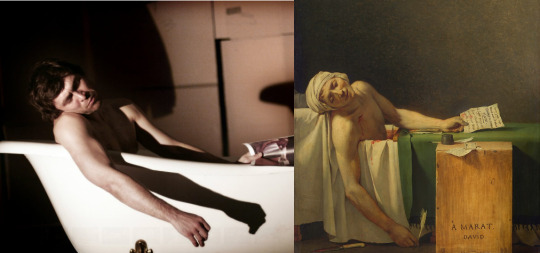
This is the very first scene of a controversial theatre adaptation of The Danton Case. Instead on portraying Robespierre as a firm leader, who only in the very end collapsed temporarily under the huge responsibility he now had to bear, the director decided to portray him as someone physically weak, not in the sense Danton meant when he called him a weakling, but in the sense of somebody who already bears so much responsibility, pain, physical ailments, doubts and whatnot. Just: everything, everythin a human could possible deal with, he deals with, and has to do so in a way that doesn't make people suspiscious about his "shortcomings". There is a interesting parallel between him and Saint-Just, whose upright and unbreakeable character is symbolised by a neck braces, something which people wear after a spine endangering accidents - and incidentally, wasn't it Saint-Just who accused Robespierre of "breaking his spine"? But not in this adaptation, oh no - here their very last scene is cut extremely short and they recite the last few sentences along with some Thermidor lines as two floating heads, a vision into the future which awaits them.
Enough about Saint-Just, though, let's focus on Robespierre and Marat. I must admit I know next to nothing about him, only what some passage here and there in this or that historical study might tell me, but I know, as does everybody, that he was known as L'ami du Peuple, which is why of the reasons, I think, why the director took this image and transposed it onto Robespierre: to make him even more likeable, to show for the umpteenth time that it is Robespierre whom we should cheer on and whom we should feel sorry for. This might also be a parallel between their both's tarnished health, their premature deaths and - last but not least - the role of an icon of the Rvolution both of them play in nowadays' audience's minds. You don't have to study history to knowwho Robespierre was, you don't have to study art to know this painting. Even if you don't agree with some more in-depth explanation of linking this person to this painting, it is a good opening image. It captures our attention in a good way.
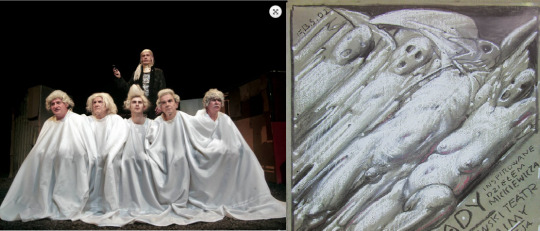
I had mention Saint-Just and there he is, in the background of the picture, symbolically assisting Danton and his clique in their last moments. Instead of shwoign them in torn shirts, the director went into another direction altogether and enshrouded them in white sheets from heads to toes, making them all look like very stereotypical ghosts, whom they will all become in just a couple of moments.
In Polish culture, the first thing that comes to mind when talking about ghosts is Dziady, an old slavic tradition that is now replaced with the Catholic All Souls Eve. Dziady is no longer, apart from perhaps some small minorities who still practice old pagan faiths, but as a ritual, they are immortalised in a play by Adam Mickiewicz, undoubtedly the greatest Polish poet ever. Everybody know this play, some scens - by heart, and they were and are being staged pretty much constantly from one point on. Needless to say, they inspire a lot of art, and I decided to show this very fmous poster by the most famous Polish poster designer, Franciszek Starowieyski…
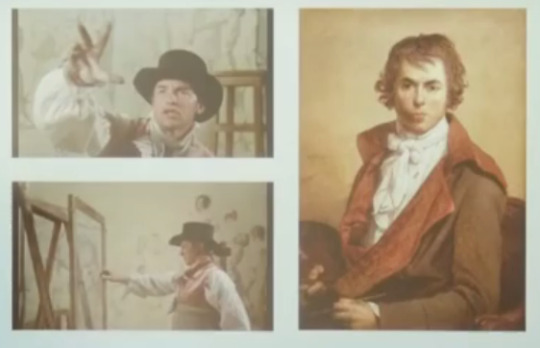
…who is important in this case, because he played David in Wajda's movie.
Not many people know - because his other carreer overshadowed by a lot his first one - that Wajda was a painter. Who actually hated his art, some of his pieces are in the national museum of contemporary art in Łódź alongside stars such as Władysław Strzemiński (the hero of Wajda's very last movie), which is a fact he absolutely detested. I dont know, nor do I care, why was that, because what matters is his previous education as an artist at the very least helped him not only to envision the visuals of the movie, but also acquainted him with great works of art. On which he could model this or that setup. I think it's a nice little detail he catsed Starowieyski as David, a real painter acting as another real painter, it adds a layer of reality onto the movie, and presumably makes for a more natural acting in the few scenes he was in his studio (I also think they look alike).
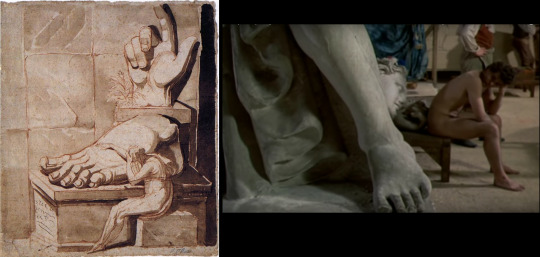
Speaking of David's studio, I once stumbled upon a lecture which drew parallels between some scenes in the movie and some paitings, which was mostly focused on character and costume design, and truth be told didn't contribute much to the overall watching experience of Danton. However, I must admit the lecturer had a very good eye in this one particular case, in which he pointed out that this quick shot in David's studio pretty obviously invokes the Fussli's The Artist's Despair Before The Grandeur Of Ancient Ruins. I don't think it's a coincidence (or at the very least, would be funny if it were) this shot is shown during the scene where Robespierre starts to grasp at desperate measures to save the country/save his own face in the trial. It is an artist's despair, only artist of a different kind. And it is a despair when being faced with a (possible) ruin of something great, even if its greatness is not yet formed, as opposed to the greatness passed.
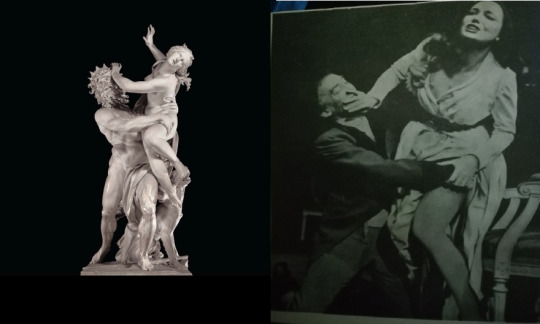
The very last example I was able to think of was this photo I found of The Danton Case from 1975. It is one of those old, very classical (I presume) adaptations, which are mostly filled to the brim with riddiculosly attractive people and very often deliberately drew from other sources of artistry, like the one pictured above. No matter what the real relationship between Louise Danton and her husband was, in the play it is portrayed as something atrocious, and I cringe whenever directors try to make it something else without good reasons for doing so, so I am very glad in the past at least they stuck with classicaly depicted acts of violation against women, not because it is a violation, but because in the classical stories (like the myth of Persephone shown in the sculpture above) the woman will usually get her revenge. Just like Przybyszewska's Louison did.
Thank you for bearing with me until the end, and if you have any other examples of this come to your mind, I compel you to share them with me!
List of pieces of art in the order of their appearance:
Jacques-Louis David, The Death of Marat
Franciszek Starowieyski, Dziady
Jacques-Louis David, Self-portrait
Heinrich Fussli, The Artist's Despair Before The Grandeur Of Ancient Ruins
Gianlorenzo Bernini, The Rape Of Persephone
#Stanisława Przybyszewska#stanislawa przybyszewska#andrzej wajda#the danton case#sprawa dantona#thermidor#jan klata#jerzy krassowski#jacques louis david#heinrich fussli#gianlorenzo bernini#art#ekphrasis#franciszek starowieyski#painting#sculpture#ekfraza#rzeźba#sztuka#Ekphrasis is my current hobby so I had to pull this together
40 notes
·
View notes
Note
hello! how are you? i hope you're doing fine, um i'm here because i wanted to ask if you can write about armin falling in love with someone who's related to art, like a painter and suddenly discovering a whole new world. i will be so happy if you can do it.
thank you and please, stay healthy! 💗
Hi💛 of course! I really love that idea! Plus as a painter myself the struggle is real man, just yesterday i was having an overwhelming meltdown over what type of brushes to buy.
You seem really lovely so here's a mini fic! 🌸
Armin falling in love with a Painter!reader
{ Armin x reader | tw: none | fluff, pinning | modern }

{ "The Cathedral of Saint Jacques le Mineur, Liege" 1846 by Jenaro Pérez Villaamil 1807 - 1854 }
Reading is Armin's best friend, it always has been. It kept him company on countless sleepless nights as a child, and now it offered the escape his soul needed when overwhelmed with troubles of being a living human in this current world.
"It's just captivating," he explained to you one day while walking together, happily clutching the bags of books he just baught. You like how they smell. For someone who reads a lot, he surely seems to be out of words when it comes to describing things he's passionate about.
The winds picks up, your steps slow down. Armin is staring at your face, but it's not your eyes he's looking at. You smile and it brings him back to reality, he looks away, shifting his weight from one leg to the other.
You offer to hold some of the heavy bags for him, he gives a warm smile. You think the faint color on his cheek is a really nice shade of pink, it looks lovely under the sun.
The more he took you with him on trips to the far away bookshop near the Riverside, the more you started to understand how a rearranging of words can pull him inside an entirely different world.
It was like he could be his true self when there, carefully reading the description at the back of the books. Frowning whenever he finds a review instead of a summary. you didn't mind tho, because it ment he'd have to read a few pages into the book and the shop had a nice corner couch you two would sit in.
He'd apologise for troubling you, you'd say he's never a bother for you that and reassure him that you enjoyed every last second.
Ah, there it is, that nice shade of pink again.
-
In some way he managed to share his love for books with you, as you spend entire afternoons just sitting near each other. Your sketchbook in hand, the sound of your pencil lightly scratching the paper. Him next to you, his book in hand and reading just loud enough for you to hear.
You think he has a nice voice, so you say it out loud. For the rest of the evening, he stuttered through half the book.
You laugh at the funny moments together, be it a clever joke the author weaved in a serious moment or an incredibly redundant cliche trope that while predictable, was still as enticing.
He would always look at you whenever you let a chuckle escape, staring just for a couple seconds longer than necessary.
That sketch ended up getting turned into a painting when Armin walked you home that day.
-
"I'm so sorry, I didn't mean to!"
Blue glass shards are scattered on the table and floor, what remained of Armin's favourite mug. The puddle of coffee already sweeping into the canvas you left to dry there this morning.
It took you three days just for the layering.
It was a big canvas, cotton paper and natural wood. It cost a lot.
You know this feeling when you're so so broken about something that your brain just skips the denial and anger and jumps straight into depression? To say you were mad was an underestimated, and rightfully so.
Armin is trying to remove the coffee stains with the nearest towel he could find, it only smudges the paint more.
He looks terrfied.
"It was an accident I swear, I'd never..." his voice takes a higher pitch, hands shaking. "I'd never, ever mean to do this...I..." he hiccups, Voice quivering..
And just like that, all you anger fades away.
"Armin, hey" you take a step closer, carefully avoiding the broken glass.
He doesn't look at you, he's still desperate wiping the canvas. "I'll fix it, please I'll figure out a way."
The clutch he has on the towel only intensifies when you put your hand on his shoulder. "It's okay," you say "it's fine really, look at me."
And he does, with shame filled eyes. "No no no, it's not. I ruined it, your worked so hard on this and I just..." He looks down "it's NOT okay."
"Yes it is." You try to guide him away from the glass. "That's just a material object Armin, what's important is that you're okay."
He reluctantly follows, you both sit on the couch. His hands are clutching his knees. "I'm really sorry, it's okay if you want to yell at me you have the right to."
You cup his face in your hands, "don't say that, that's not true. It was an accident, I'd never ever yell at you."
Shock is clear in his eyes, his arms leave his knees to wrap around you, pulling you closer. His face buried in your shoulder. You stroke his back. Both of you stay like this for a long while, neither of you seems to want to let go.
At night, when he's getting ready to leave and go back home. You walk him to the door and he kisses your cheek as a goodbye.
the shade of pink you grew to love really goes along with his smile.
-
"Close your eyes and hold out your hand."
With the sparkle in his blue eyes and his hands hiding something behind his back, how could you say no.
So you do, and you feel his hand brushing against yours before a light weight is dropped on your palms. He gives you the okay so you open your eyes, an envelope.
It's cream white with a straw ribbon around it, it looks too good to open but you do anyway.
"Is that..." his smile grows as you pull out the card and paper inside, "a membership card."
"For the art course you've been saving up for! You seemed really excited when talking about it." He takes a step closer, tilting his head to the side as his blond hair brush against his neck. "Do you like it?"
"Armin I love it!" You're so happy that you don't dwell on it before pulling him into a hug, he eagrly hugs back and his hand lingers on you when you pull away. "But...isn't it too expensive ? How did you.."
His lips press into a thin line as he looks to the side, "don't worry about it, I've been also saving for a different reason."
Oh...yeah you know the reason, Eren’s been telling it to everyone after all. The three of them agreed to go on a trip overseas, even Mikasa seemed genuinely excited.
You look at him, you look at the envelope containing the art course of your dreams, you put the card back inside.
"I can't, " you hold it out for him, "you can still return this, they're very lean with their policies."
He doesn't take it. "Yes, yes you can. This isn't just because I feel bad for what i did, it's because..." he holds your hand in his, "because I want you to have it, you deserve the world and if i can I'd give it to you."
"But what about Mikasa and Eren, you know they've been looking forward for this."
"They'll understand that i can't come, and if they don't it's okay, they'll still enjoy it by themselves." He cups your face, looking at you like you're the only person in the world, "It's just a material thing after all, you aren't."
-
Armin likes to get out of his comfort zone evey once in a while, he likes to try new things no matter how intimidating they look.
Which is why, seeing him hesitantly entering the art classroom was not a surprise. His wide eyes switching their focuses between all the different objects in the room, from the canvas with a glaze shine on them, ready to get painted. Or the different shapes and sizes or brushes, the ones near the water jars looking softer than the rest.
You should've seen this coming, with Eren and Mikasa away on their trip, Armin has been hanging around you all the time. Not that you're complaining.
Looking at your still drying canvas, you quickly cleaned off your brush before using a towel to wipe your hands and elbows from paint stains.
"Armin," you said, amusement in your voice at seeing the blond out of his usual element. His curious eyes focus on you and he says a small hi with a wave.
You walk him through the basics, he nods while you explain the pros and cons of each paint type, what type of paintings it goes with and which techniques are the most common.
After a couple minutes of him asking you to show him to use certain things and hold some brushes, he settles down for watercolors. You think it's adorably fitting.
While picking his brushes, you explain how in order to not damage the cotton papers, they have the softest hairs. To make your point, you take his arm in your hand and run a soft brush against his palm. He laughs softly saying it tickles, it's contagious and you're laughing too soon.
He picks the seat next to you, looking lost with the short brush in his hand and the already wet canvase. But it's a nice kind of lost, like the way a child would look at a new toy.
While he expriments at the corner of the canvas with different brushes and swipes the colors, other people start filling the room and soon enough everyone has taken their seats.
The instructer begans setting up today's study object, a couple of pink Camellias in a tinted turquoise vase, creating a nise color contrast.
You stare at them for a while, wondering where did you see that fimilar faint of pink. The question answers itself when Armin taps your shoulder and ask how to start layering the paint
-
It's around sunset when the two of you are walking together, he's talking about all the new things he never knew about art that he just discovered today. You're listening to him while nodding occasionally, it's when he stops mid-rant that you look at him.
"I just realised something" he says, before facing you.
"Oh? And what is it"
He looks at you, really looks at you. The sun is shining behind you as it says its last goodbyes for the day, making you look heavenly. "I realised that...I'm deeply in love with you"
#Armin#armin arlet x reader#armin x reader#armin x y/n#armin arlert#armin reader#armin🕯#mini fic#fluff#painter!reader#i like this :)#pinning#friends to lovers?#aot#snk#aot x reader#snk x reader
143 notes
·
View notes
Text
Anonymous said: I didn’t know too much about the late British philosopher Sir Roger Scruton until I followed your superbly cultured blog. As an ivy league educated American reading your posts, I feel he is a breath of fresh air as a sane and cultured conservative intellectual. We don’t really have his kind over here where things are heavily polarized between left and right, and sadly, we are often uncivil in our discourse. Sir Roger Scruton talks a lot about beauty especially in art (as indeed you do too), so for Scruton why does beauty as an aesthetic matter in art? Why should we care?
I thank you for your very kind words about my blog which I fear is not worthy of such fulsome praise.
However one who is worthy of praise (or at least gratitude and appreciation at least) is the late Sir Roger Scruton. I have had the pleasure to have met him on a few informal occasions.
Most memorably, I once got invited to High Table dinner at Peterhouse, Cambridge, by a friend who was a junior Don there. This was just after I had finished my studies at Cambridge and rather than pursue my PhD I opted instead to join the British army as a combat pilot officer. And so I found out that Scruton was dining too. We had very pleasant drinks in the SCR before and after dinner. He was exceptionally generous and kind in his consideration of others; we all basked in the gentle warmth of his wit and wisdom.
I remember talking to him about Xanthippe, Socrate’s wife, because I had read his wickedly funny fictional satire. In the book he credits the much maligned Xanthippe with being the brains behind all of Socrates’ famous philosophical ideas (as espoused by Plato).
On other occasions I had seen Roger Scruton give the odd lecture in London or at some cultural forum.
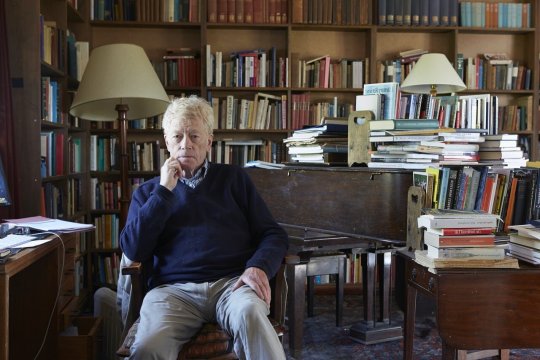
Other than that, I’ve always admire both the man and many of his ideas from afar. I do take issue with some of his intellectual ideas which seem to be taken a tad too far (he think pre-Raphaelites were kitsch) but it’s impossible to dislike the man in person.
Indeed the Marxist philosopher G.A. Cohen reportedly once refused to teach a seminar with Scruton, although they later became very good friends. This is the gap between the personal and the public persona. In public he was reviled as hate figure by some of the more intolerant of the leftists who were trying to shut him down from speaking. But in private his academic peers, writers, and philosophers, regardless of their political beliefs, hugely respected him and took his ideas seriously - because only in private will they ever admit that much of what Scruton talks about has come to pass.
In many ways he was like C.S. Lewis - a pariah to the Oxbridge establishment. At Oxford many dons poo-pooed his children stories, and especially his Christian ideas of faith, culture, and morality, and felt he should have laid off the lay theology and stuck to his academic speciality of English Literature. But an Oxford friend, now a don, tells me that many dons read his theological works in private because much of what he wrote has become hugely relevant today.
Scruton was a man of parts, some of which seemed irreconcilable: barrister, aesthetician, distinguished professor of aesthetics. Outside of brief pit stops at Cambridge, Oxford, and St Andrews, he was mostly based out of Birkbeck College, London University, which had a tradition of a working-class intake and to whom Scruton was something of a popular figure. He was also an editor of the ultra-Conservative Salisbury Review, organist, and an enthusiastic fox hunter. In addition he wrote over 50 books on philosophy, art, music, politics, literature, culture, sexuality, and religion, as well as finding time to write novels and two operas. He was widely recognised for his services to philosophy, teaching and public education, receiving a knighthood in 2016.
He was exactly the type of polymath England didn’t know what to do with because we British do discourage such continental affectations and we prefer people to know their lane and stick to it. Above all we’re suspicious of polymaths because no one likes a show off. Scruton could be accused of a few things but he never perceived as a show off. He was a gentle, reserved, and shy man of kindly manners.
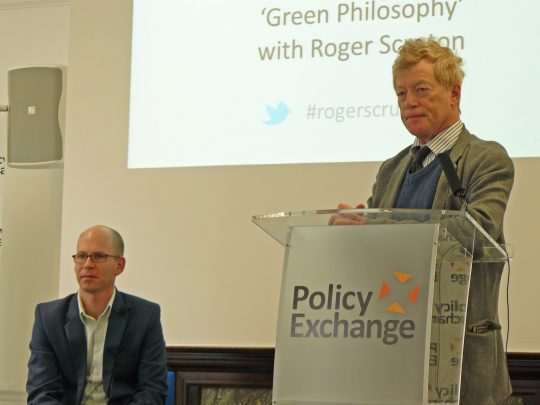
He was never politically ‘Conservative’, or tried not to be. Indeed he encouraged many to think about defining “a philosophy of conservatism” and not “a philosophy for the Conservative Party.” In defining his own thoughts, he positioned conservatism to relation to its historical rivals, liberalism and socialism. He wrote that liberalism was the product of the enlightenment, which viewed society as a contract and the state as a system for guaranteeing individual rights. While he saw socialism as the product of the industrial revolution, and an ideology which views society as an economic system and the state as a means of distributing social wealth.
Like another great English thinkers, Michael Oakeshott, he felt that conservatives leaned more towards liberalism then socialism, but argued that for conservatives, freedom should also entail responsibility, which in turn depends on public spirit and virtue. Many classical liberals would agree.
In fact, he criticised Thatcherism for “its inadequate emphasis on the civic virtues, such as self-sacrifice, duty, solidarity and service of others.” Scruton agreed with classical liberals in believing that markets are not necessarily expressions of selfishness and greed, but heavily scolded his fellow Conservatives for allowing themselves to be caricatured as leaving social problems to the market. Classical liberals could be criticised for the same neglect.
Perhaps his conservative philosophy was best summed up when he wrote “Liberals seek freedom, socialists equality, and conservatives responsibility. And, without responsibility, neither freedom nor equality have any lasting value.”
Scruton’s politics were undoubtedly linked to his philosophy, which was broadly Hegelian. He took the view that all of the most important aspects of life – truth (the perception of the world as it is), beauty (the creation and appreciation of things valued for their own sake), and self-realisation (the establishment by a person of a coherent, autonomous identity) – can be achieved only as part of a cultural community within which meaning, standards and values are validated. But he had a wide and deep understanding of the history of western philosophy as a whole, and some of his best philosophical work consisted of explaining much more clearly than is often the case how different schools of western philosophy relate to one another.
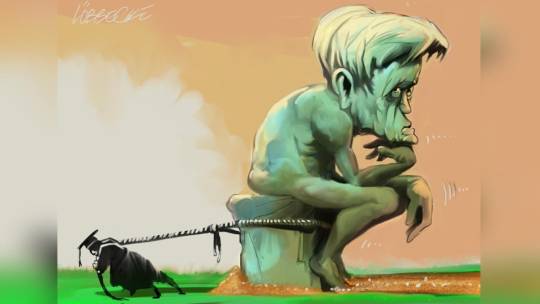
People today still forget how he was a beacon for many East European intellectuals living under Communist rule in the 1980s. Scruton was deeply attached in belonging to a network of renowned Western scholars who were helping the political opposition in Eastern Europe. Their activity began in Czechoslovakia with the Jan Hus Foundation in 1980, supported by a broad spectrum of scholars from Jacques Derrida and Juergen Habermas to Roger Scruton and David Regan. Then came Poland, Hungary and later Romania. In Poland, Scruton co-founded the Jagiellonian Trust, a small but significant organisation. The other founders and active participants were Baroness Caroline Cox, Jessica Douglas-Home, Kathy Wilkes, Agnieszka Kołakowska, Dennis O’Keeffe, Timothy Garton Ash, and others.
Scruton had a particular sympathy for Prague and the Czech society, which bore fruit in the novel, Notes from Underground, which he wrote many years later. But his involvement in East European affairs was more than an emotional attachment. He believed that Eastern Europe - despite the communist terror and aggressive social engineering - managed to preserve a sense of historical continuity and strong ties to European and national traditions, more unconscious than openly articulated, which made it even more valuable. For this reason, decades later, he warned his East European friends against joining the European Union, arguing that whatever was left of those ties will be demolished by the political and ideological bulldozer of European bureaucracy.
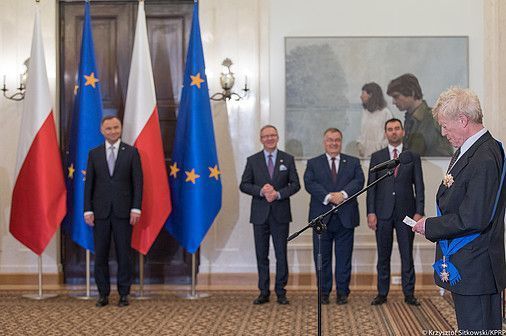
Anyway, digressions aside, onto to the heart of your question.
Art matters.
Let’s start from there. Regardless of your personal tastes or aesthetics as you stand before a painting, slip inside a photograph, run your hand along the length of a sculpture, or move your body to the arrangements spiraling out of the concert speakers…something very primary - and primal - is happening. And much of it sub-conscious. There’s an element of trust.
Political philosopher, Hannah Arendt, defined artworks as “thought things,” ideas given material form to inspire reflection and rumination. Dialogue. Sometimes even discomfort. Art has the ability to move us, both positively and negatively. So we know that art matters. But the question posed by modern philosophers such as Roger Scruton has been: how do we want it to affect us?
Are we happy with the direction art is taking? Namely, says, Scruton, away from seeking “higher virtues” such as beauty and craftmanship, and instead, towards novelty for novelty’s sake, provoking emotional response under the guise of socio-political discourse.
Why does beauty in art matter?
Scruton asks us to wake up and start demanding something more from art other than disposable entertainment. “Through the pursuit of beauty,” suggests Scruton, “we shape the world as our own and come to understand our nature as spiritual beings. But art has turned its back on beauty and now we are surrounded by ugliness.” The great artists of the past, says Scruton, “were painfully aware that human life was full of care and suffering, but their remedy was beauty. The beautiful work of art brings consolation in sorrow and affirmation…It shows human life to be worthwhile.” But many modern artists, argues the philosopher, have become weary of this “sacred task” and replaced it with the “randomness” of art produced merely to gain notoriety and the result has been anywhere between kitsch to ugliness that ultimately leads to inward alienation and nihilistic despair.
The best way to understand Scruton’s idea of beauty in art and why it matters is to let him speak for himself. Click below on the video and watch a BBC documentary broadcast way back in 2009 that he did precisely on this subject, why beauty matters. It will not be a wasted hour but perhaps enrich and even enlighten your perspective on the importance of beauty in art.
vimeo
So I’ll do my best to summarise the point Scruton is making in this documentary above.
Here goes.....
In his 2009 documentary “Why Beauty Matters”, Scruton argues that beauty is a universal human need that elevates us and gives meaning to life. He sees beauty as a value, as important as truth or goodness, that can offer “consolation in sorrow and affirmation in joy”, therefore showing human life to be worthwhile.
According to Scruton, beauty is being lost in our modern world, particularly in the fields of art and architecture.
I was raised in many different cultures from India, Pakistan, to China, Japan, Southern Africa, and the Middle East as well schooling in rural Britain and Switzerland. So coming home to London on frequent visits was often a confusing experience because of the mismatch of modern art and new architecture. In life and in art I have chosen to see the beauty in things, locating myself in Paris, where I am surrounded by beauty, and understand the impact it can have on the everyday.
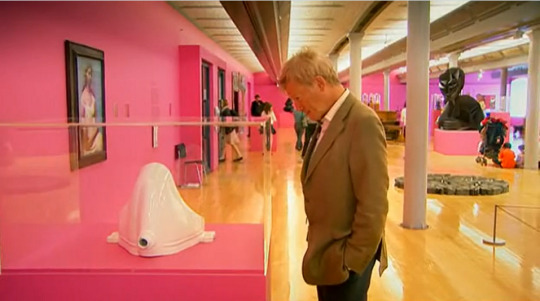
Scruton’s disdain for modern art begins with Marcel Duchamp’s urinal. Originally a satirical piece designed to mock the world of art and the snobberies that go with it, it has come to mean that anything can be art and anyone can be an artist. A “cult of ugliness” was created where originality is placed above beauty and the idea became more important than the artwork itself. He argues that art became a joke, endorsed by critics, doing away with a need for skill, taste or creativity.
Duchamp’s argument was that the value of any object lies solely in what each individual assigns it, and thus, anything can be declared “art,” and anyone an artist.
But is there something wrong with the idea that everything is art and everyone an artist? If we celebrate the democratic ideals of all citizens being equal and therefore their input having equal value, doesn’t Duchamp’s assertion make sense?
Who’s to say, after all, what constitutes beauty?
This resonated with me in particular and brought to mind when Scruton meets the artist Michael Craig-Martin and asks him about how Duchamp’s urinal first made him feel. Martin is best known for his work “An Oak Tree” which is a glass of water on a shelf, with text beside it explaining why it is an oak tree. Martin argues that Duchamp captures the imagination and that art is an art because we think of it as such.
When I first saw “An Oak Tree” I was confused and felt perhaps I didn’t have the intellect to understand it. When I would later question it with friends who worked in the art auction and gallery world, the response was always “You just don’t get it,” which became a common defence. To me, it was reminiscent of Hans Christian Andersen’s short tale “The Emperor’s New Clothes”, about two weavers who promise an emperor a new suit of clothes that they say is invisible to those who are unfit for their positions, stupid or incompetent. In reality, they make no clothes at all.
Scruton argues that the consumerist culture has been the catalyst for this change in modern art. We are always being sold something, through advertisements that feed our appetite for stuff, adverts try to be brash and outrageous to catch our attention. Art mimics advertising as artists attempt to create brands, the product that they sell is themselves. The more shocking and outrageous the artwork, the more attention it receives. Scruton is particularly disturbed by Piero Manzoni’s artwork “Artist’s Shit” which consists of 90 tin cans filled with the artist’s excrement.
Moreover the true aesthetic value, the beauty, has vanished in modern works that are selling for millions of dollars. In such works, by artists like Rothko, Franz Kline, Damien Hirst, and Tracey Emin, the beauty has been replaced by discourse. The lofty ideals of beauty are replaced by a social essay, however well intentioned.
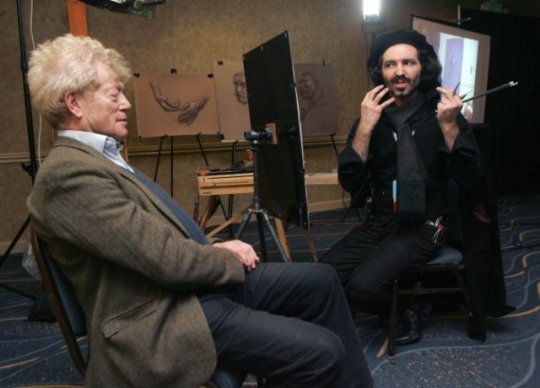
A common argument for modern art is that it is reflecting modern life in all of its disorder and ugliness. Scruton suggests that great art has always shown the real in the light of the ideal and that in doing so it is transfigured.
A great painting does not necessarily have a beautiful subject matter, but it is made beautiful through the artist’s interpretation of it. Rembrandt shows this with his portraits of crinkly old women and men or the compassion and kindness of which Velazquez paints the dwarfs in the Spanish court. Modern art often takes the literal subject matter and misses the creative act. Scruton expresses this point using the comparison of Tracey Emin’s artwork ‘My Bed’ and a painting by Delacroix of the artist’s bed.
The subject matters are the same. The unmade beds in all of their sordid disdain. Delacroix brings beauty to a thing that lacks it through the considered artistry of his interpretation and by doing so, places a blessing on his own emotional chaos. Emin shares the ugliness that the bed shows by using the literal bed. According to Emin, it is art because she says that it is so.
Philosophers argued that through the pursuit of beauty, we shape the world as our home. Traditional architecture places beauty before utility, with ornate decorative details and proportions that satisfy our need for harmony. It reminds us that we have more than just practical needs but moral and spiritual needs too. Oscar Wilde said “All art is absolutely useless,” intended as praise by placing art above utility and on a level with love, friendship, and worship. These are not necessarily useful but are needed.
We have all experienced the feeling when we see something beautiful. To be transported by beauty, from the ordinary world to, as Scruton calls it, “the illuminated sphere of contemplation.” It is as if we feel the presence of a higher world. Since the beginning of western civilisation, poets and philosophers have seen the experience of beauty as a calling to the divine.
According to Scruton, Plato described beauty as a cosmic force flowing through us in the form of sexual desire. He separated the divine from sexuality through the distinction between love and lust. To lust is to take for oneself, whereas to love is to give. Platonic love removes lust and invites us to engage with it spiritually and not physically. As Plato says, “Beauty is a visitor from another world. We can do nothing with it save contemplate its pure radiance.”
Scruton makes the prescient point that art and beauty were traditionally aligned in religious works of art. Science impacted religion and created a spiritual vacuum. People began to look to nature for beauty, and there was a shift from religious works of art to paintings of landscapes and human life.

In today’s world of art and architecture, beauty is looked upon as a thing of the past with disdain. Scruton believes his vision of beauty gives meaning to the world and saves us from meaningless routines to take us to a place of higher contemplation. In this I think Scruton encourages us not to take revenge on reality by expressing its ugliness, but to return to where the real and the ideal may still exist in harmony “consoling our sorrows and amplifying our joys.”
Scruton believes when you train any of your senses you are privy to a heightened world. The artist sees beauty everywhere and they are able to draw that beauty out to show to others. One finds the most beauty in nature, and nature the best catalyst for creativity. The Tonalist painter George Inness advised artists to paint their emotional response to their subject, so that the viewer may hope to feel it too.
It must be said that Scruton’s views regarding art and beauty are not popular with the modern art crowd and their postmodern advocates. Having written several books on aesthetics, Scruton has developed a largely metaphysical aspect to understanding standards of art and beauty.
Throughout this documentary (and indeed his many books and articles), Scruton display a bias towards ‘high’ art, evidenced by a majority of his examples as well as his dismissal of much modern art. However on everyday beauty, there is much space for Scruton to challenge his own categories and extend his discussion to include examples from popular culture, such as in music, graphic design, and film. Omitting ‘low art’ in the discussion of beauty could lead one to conclude that beauty is not there.
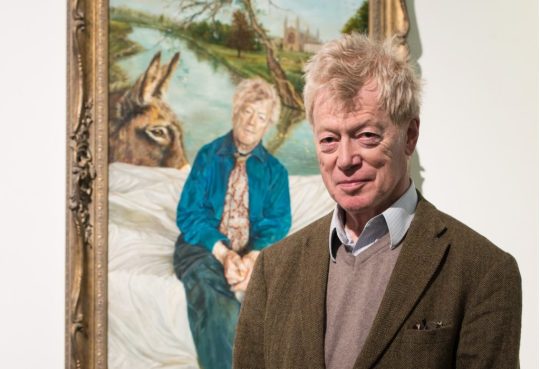
It is here I would part ways with Scruton. I think there is beauty to be found in so called low art of car design, popular music or cinema for example - here I’m thinking of a Ferrari 250 GTO, jazz, or the films of Bergman, Bresson, or Kurosawa (among others) come to mind. Scruton gives short thrift to such 20th century art forms which should not be discounted when we talk of beauty. It’s hard to argue with Jean-Luc Godard for instance when he once said of French film pioneering director, Robert Bresson, “He is the French cinema, as Dostoevsky is the Russian novel and Mozart is German music.”
Overall though I believe Scruton does enough to leave us to ponder ourselves on the importance of beauty in the arts and our lives, including fine arts, music, and architecture. I think he succeeds in illuminating the poverty, dehumanisation and fraud of modernist and post-modernist cynicism, reductionism and nihilism. Scruton is rightly prescient in pointing the centrality of human aspiration and the longing for truth in both life and art.
In this he is correct in showing that goodness and beauty are universal and fundamentally important; and that the value of anything is not utilitarian and without meaning (e.g., Oscar Wilde’s claim that “All art is absolutely useless.”). Human beings are not purposeless material objects for mechanistic manipulation by others, and civil society itself depends upon a cultural consensus that beauty is real and every person should be respected with compassion as having dignity and nobility with very real spiritual needs to encounter and be transformed and uplifted by beauty.
Thanks for your question.
#ask#question#sir roger scruton#scruton#art#aesthetics#beauty#architecture#music#paintings#film#cinema#personal
48 notes
·
View notes
Text
Invisible String (Napoleon Bonaparte x Reader)
Prompt #4 and #77 by @missmorosis: “Marry me. Now.” and “I can’t say her name without smiling!”

Tags: Fluff + Mutual Pining. PS: Everything in Italic is spoken in French. –♥–
As the song “Sacré Charlemagne” rang loudly in the air, you were whisked into a jolly circle with the children in the little school that Napoleon and Isaac created by the fountain, which you always seemed to forget the name. You absolutely hated using the term “poor children” as everyone referred to them so you made an effort to learn and memorize each one of their names, even if it earned you a few devilish snickers when you stuttered over a few of their names, fumbling through your misconstructed sentences.
Compared to the children, your grammar and vocabulary was absolutely atrocious and it seemed like the infamous Monsieur de Wahaha found way too much pleasure in it, you could see him biting his bottom lip, muffling his chuckle yet his shoulders gave him away before the rambunctious sound escaped him, racking through his entire body. The few swats that Napoleon had to suffer from you did not deter him from losing himself into a fit of laughter. Your expressions never failed to amuse him, his heart feeling lighter than it had ever been in his chest and the adorable pout on your lips that tempted a little too much.
Just to press his lips against yours, Napoleon would always think. Only for a moment, that’s all he wished for. To simply hold you in his arms, engulf you in his warm embrace, where you would be safe and… loved. Feel your soft plush lips and watch as your face turns to a bright shade of red that roses would envy. His thoughts always found a way to drift to you. The petite nunuche with a kind heart, a bright mind and sass that could rival Mozart’s snark.
While you attempted to decipher the words that you were singing, your botched pronunciation did not help much though, the children jumping around, pulling you forcefully into the merry atmosphere that you had absolutely no qualms to join. Fingers that were even smaller than yours wrapped tightly around your palms, squeezed them as tightly as you felt your heart clench in your chest. Even when you were so far from the place you truly called home, with Napoleon, with these children, you found another meaning to the word. How was it that even when you were in the middle of dancing and having fun, your mind was still flooded with thoughts of him? Finding absolutely any hook just to keep him in your mind, clinging to you with no chance for you to escape from them. Even if you wanted to. Was it because he was near? Was it because you felt his eyes on you? Without even looking, you could feel the intensity of his piercing gaze, thoughtful yet kind, that made your body go through a plentiful of sensations that were too many to count on your fingers. Napoleon didn’t realize that he had paused his lesson, his eyes trained on you, seeing you radiate happiness, the happiness that the little ones shared with you even when they lived in some of the most dire of circumstances. If there is anything that you have learned, it was that the smallest things that made a difference. It is the little things that truly mattered. That is a truth that the former Emperor himself has come to realize after being relieved from the responsibility of leading his country and has tasked himself in aiding those that would be the future of France. “Who taught you that song, Clement?” Napoleon called out to one of the boys that were in your circle, shaking his head incredulously and still laughing for a reason that you had still yet to uncover. You weren’t sure what Napoleon was necessarily asking but it was definitely about the song. That was the only word ‘chanson’ that you recognized in his sentence.
“All of you. Come here and form a circle. I think it’s about time that you all learn about what Charlemagne has truly done and why you should be grateful.” Chuckling to himself, he stood from the spot he was sitting in and walked towards you, leaning down so that you were both eye to eye. You didn’t know why every time he did that, it made your heart flutter, doing a bunch of those weird somersaults that kinda made you want to puke.. But not really, at the same time. Being around Napoleon made you feel a flurry of strange sensations. Thinking about him too. That was a fact. “You do realize that this song depicts how much children hold contempt for Charlemagne for inventing school? Whatever you were singing with them right now beats the whole purpose of what we are trying to do for them.” With an eyebrow cocked, Napoleon folded his arms in front of his chest, waiting for a response from you yet the corner of his lips were clearly strained as he fought back a wide smile. “Wait…” You blinked at him in surprise, clearly unaware of the situation that you were put into due to the language barrier. “I… I promise I had no idea! That was definitely and totally not my intention! Oh my God…” It was a funny situation and you found yourself stuck between a state of slight panic and laughter, both emotions reflecting clearly on your visage. The last thing that you wanted was for Napoleon to be disappointed in you. You held him in such high regards, and he did so to you when it came to you, so you didn’t want to do anything to ruin that. A small laugh escaped him, his large hand reaching to ruffle your hair gently before tucking the stray strands away from your face and behind your ear. A gesture that was so simple yet that was done with so much love. Love that you were completely blind to. “This is why you’re my petite nunuche. Come sit and I’ll explain it all to you, princess.” The sly grin he gave you, one that was more like a wide smile, was much too irresistible, your own smile tracing across your blushing face. As he turned away from you and found his seat before everyone, you noticed something. You knew that look in his eyes. It was one that you knew very well, the passion brimming in them, the heart he put into teaching these childrens and sharing with them everything that he had to give. Nothing was ever too much to ask for with Napoleon. God… you couldn’t stop staring at him and you still hadn’t realized why, assuming it was just because he was a born charismatic leader who was now capturing everyone’s attention as he began a history lesson about the medieval emperor Charlemagne and all he had done for France and for the world. Whenever any discussion happened between you, he always leaned down and looked straight into your eyes, especially since you were quite shorter than him. Even when you stood next to one another, he still did the same. Not only with you but with the kids as well, crouching down so that he was on the same level as them, never making anyone feel as though they were inferior. Never looking down on anyone. He spoke to all, treated all, as his equals. No matter who they were. Your daydreams and musings aside, you tried to focus on Isaac’s voice as he spoke in your ear, recounting to you in English all of the stories that Napoleon was painting before all of your eyes. His mind being a wealth of historical knowledge, he ensnared you with his storytelling, even when you had absolutely no idea what he was saying, needing the help of your dear friend, Isaac Newton, to explain it all to you.
“I have a question, Napoleone!” One of the kids, Patrick, raised his hand excitedly and was basically hopping on his cute little butt, curiosity seemingly eating at the young boy. When Leon gave him a curt nod, Patrick giggled and asked. “Why do you call big sister, nunuche?” “Well, there’s a very simple answer to that question. I call her nunuche because she has absolutely no clue that she has stolen my heart.” He declared with a warm smile, his deep voice reflecting the same. As the conversation took a turn, Isaac clicked his tongue, grumbling something that you didn’t catch under his breath and walked away from the big circle that you had formed in the middle of the small town square. Some of the kids were giggling and others were making gag noises. Whatever Napoleon had said really changed the mood. With your eyebrows furrowed, it was a bit bizarre to see the physicist’s face suddenly turn red. Was he that irritated from the story Napoleon was telling the kids about Charlemagne? Now that Isaac was gone, you were left with no one to translate the ongoing discussion for you. Well, upon Napoleon’s instruction, whenever he was addressing the children directly and couldn’t directly translate to you, Isaac would have to step in for him and help you understand the different French expressions and words, especially the most common ones. But… what were they saying now? You did hear the word Nunuche but they were definitely not talking about you. Were they, though? Still, you didn’t want to leave, even if you were completely lost and oblivious to what was going on. You knew that Napoleon would explain it all to you later. “Does that mean that big sister is a thief?” Jacques asked. “Non, non.” He chuckled, shaking his head and sighing out his next words. “It means that I love her with all my heart.” “Is it like how I love my dog?” The little man inquired again. “I love mushrooms!” The youngest of them all, Carmen, chimed in with her own declaration. “Haha, we can all love different things. Love comes in many ways and we all feel it differently.” “How does it feel for you then, Napoleone?” Lea, who was sitting right by his side, inquired considerately, seemingly scrutinizing every word the Frenchman said. He couldn’t help but smile widely, admiring the smart glint in her eyes, the curiosity in her was nothing but meaningful and quite in place. Eyes that reminded of his beloved. You. “Well…” He pondered for a few seconds, trying to find a simple way of putting his feelings into words. “I can’t say her name without smiling.” And just the thought of it did the same, in that very moment. “And sometimes, I think that I might just walk up to her and simply ask her. “Marry me. Now.”” He admitted, the corner of his eyes crinkling a tiny bit as he announced so. God, now you really wanted to know what they were talking about. To know the reason why Napoleon looked almost… giddy in that calm authoritative way of his. “Oh! Oh! That means you want to also have kids with her!” Jacques, ever the talkative one, stated confidently. “Haha, indeed. That is something I do wish to have with her.” As he turned to look at you, you could see his smile turn wistful, the way his eyes fell upon you held so much longing, a yearning for something that may not ever be fulfilled. “I promise, I’ll tell you about everything we just said.” He reassured you with that exact same smile, masking the fleeting sadness that overcame him by clearing his throat, demanding everyone’s attention and returning back to his storytelling. He would tell you all about that conversation he had with the kids. Maybe not on that day… but what he had to say was for later, or maybe never. Luckily for him, none of the children knew how to speak English or they would have blurted out the confession that Napoleon had yet to make. –♥– A/N: Consider this as a snippet from your matchup story with your Leon. I hope you enjoy this @delicateikemenmemes and yes, the title is a Taylor Swift song reference hehe 💜 And thank you @sweetlittlemouse for beta-ing my insecure ass. Tagging: @nafeary @kisara-16 Please feel free to leave some love in the comments or some feedback!💜 You can also check out my Masterlist !
142 notes
·
View notes
Photo
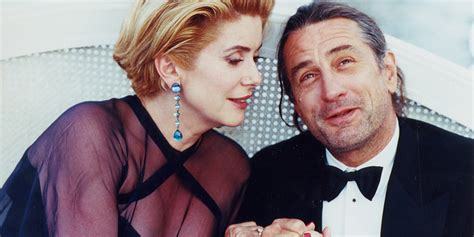
Movies I watched this week - 39
I spent over 50 (!) hours on the sofa this week, (enjoying myself 85% of the time)...
Sløborn, an ominous Danish-German TV pandemic series, very much like Soderbergh’s ‘Contagion’ and in ‘Black Mirror’ style. Normal life of a small island community between Denmark and Germany breaks down and completely collapses when it is hit by a lethal bird flue like virus.
It was extremely prescient, as it was shot in 2019, before Covid! Conceived as Si-fi, it looks today like TV, because the series was able to capture everything that happened around the world after January 2020 in accurate details.
With Roland Møller (of ‘Riders of Justice’). 7+/10
✴️
My introduction to “The grandmother of The French New Wave”, Agnès Varda (Hard to believe that I never saw her films before!):
✳️✳️✳️ “Inspiration, Creation and Sharing...” Varda by Agnès, my first Varda is her last 2019 auto-biography, in which, at 90, she shared footage and stories from her life and work. The first sample clip (of meeting her Uncle Yanco in Sausalito) won me over, and the rest convinced me to catch up on everything I’ve missed through the years. What a wonderful artist!
✳️✳️✳️ Cléo from 5 to 7. A feminine film about female identity - a new favorite! A beautiful singer must wait 2 hours for the results of her cancer tests. With a magnifique mid-film scene (at 0;38) of the heartbreaking chanson 'Sans Toi', marking the beginning of her quiet transformation.
✳️✳️✳️ Vagabond, a story of a lonely, young woman, an unapologetic drifter, unglamorous, aimless, independent, desperately lost. Dark and nonjudgmental exploration of the refusal to conform to anything. 8+/10.
✳️✳️✳️ (For Sammy - Per our conversation). The Gleaners and I, "The eighth best documentary film of all time”, per ‘Sight & Sound poll. Derived from the famous painting by Millet. Simply wonderful!
✳️✳️✳️ One Hundred And One Nights, 100 year old Michel Piccoli “Monsieur Simon Cinema”, hires a young girl to reminisce with about the history of cinema. An unsuccessful Meta-film that nevertheless is a love letter for cinephiles. Populated by 3 dozens of Who’s Who of French (and World) stars, playacting in this symbolic, Fellinisque fable that draws upon the classics. Mastroianni, Depardieu, Belmondo, Alain Delon, Catherine Deneuve, Jeanne Moreau, Anouk Aimée, Fanny Ardant, Gina Lollobrigida, Jane Birkin, etc, etc..
(Photo Above).
✳️✳️✳️ The Young Girls of Rochefort, the wonderful, colorful, sentimental musical by Varda’s husband Jacques Demy, with the most beautiful woman in the world and her sister. Romantic eye candy set to music by Michel Legrand. A year later Deneuve would do Belle de Jour, and Françoise Dorléac would die in a car accident, 8+/10
✳️✳️✳️ Even better, The Young Girls Turn 25, Varda’s 1993 behind the scenes documentary and return to small town Rocheford, to show how it changed the town and left an impression. 9/10
“...The memory of happiness is perhaps also happiness...”
✴️
The other Jacques Demy modern opera The Umbrellas of Cherbourg knocked me over all over again. Catherine Deneuve’s angelic beauty in this film made me cry for the duration like a baby. And not only at the train station when they say goodbye forever.
10/10
✴️
Night moves, a tense thriller by Kelly Reichardt, about three radical environmentalists who blow up an Oregon dam. Slow and tense, and like her ‘First Cow’, watching it filled me with constant, low-level anxiety. The off-screen sabotage is placed at the exact mid-point of the movie: The first half is the preparation for it, and the second half shows the aftermath of the act. 7+/10
✴️
2 unexpected Small Town gems by Miguel Arteta:
✳️✳️✳️ The good Girl, an odd and surprising mismatched romance between 30 year old Jennifer Aniston and Jake Gyllenhaal (22) as employees of a Texas big-box store that is always empty. Her voice-over reminded me of True Romance’s Alabama Whitman. 7/10
✳️✳️✳️ Ed Helms, a sheltered insurance salesman from the backwaters of Wisconsin, goes to an convention in the big city of Cedar Rapids, Iowa. The nearly conventional story arc has some genuinely heartfelt funny moments. With Maeby Fünke, as Bree the prostitute and Sigourney Weaver as the ex-teacher he balls. Also a surprising drug party, where he smoke crack cocaine and loves it. 5+/10
✴️
Same theme of people prostituting their own ‘morals’, the notoriously-prudish 1993 Indecent Proposal didn’t age too well. “Billionaire”-porn that asks the question ‘How much would you pay for one night with Robert Redford?’ Gratuitous semi-naked Demi Moore included.
Related: “Stop hitting the button!”
✴️
Wildland (Kød & blod = Flesh and blood), an uncomfortable and claustrophobic Danish gangster thriller about a 17 year old girl who moves in with the criminal family of Sidse Babett Knudsen, her estranged aunt. 6+/10
“For some people, things go wrong before they even begin”
✴️
Jim Jarmusch‘s Broken Flowers, a touching road film with Bill Murray, as an old ‘Don Juan’ who receive a pink, unsigned letter from an old lover, letting him know that he has a 20 year old son he never knew about.
Loveliest film of the week.
✴️
The 2 films directed by Tom Ford:
✳️✳️✳️ A single Man, a sad and lonely gay professor, closeted in 1962 Los Angeles, is preparing to kill himself with a gun, after his boyfriend / love of his life had died in a car accident. Mute and haunting aesthetics in the fashion designer’s debut film, based on a Christopher Isherwood novel.
The ‘Stormy Weather’ dance scene between Charley and George. 8/10
✳️✳️✳️ Nocturnal Animals: Amy Adams is an unhappy owner of a fancy art gallery who receives a disturbing book manuscript written by her ex-husband, which symbolizes their relationship 20 years prior. Rarefied visuals and distinctive style.
Starts with an astonishing scene of obese old ladies dancing naked at Amy’s gala event. Michael Shannon rules as a dying Texas detective! 6+/10.
✴️
Jean Vigo’s 1933 classic Zero for Conduct was so blatantly anarchistic, it was immediately banned in France until after WW2. In silent film style, it tells about a group of mischievous kids who rebel against the authorities of their old-fashioned boarding school. Part-inspiration for Truffaut's 400 Blows.
✴️
Anatomy of a murder, Otto Preminger’s 1960 courtroom drama, with opening credits by Saul Bass. Crisp black & white cinematography, and with rape victim Lee Remick playing it as an outgoing loose girl of ambiguous morals, a modern floozy. 7/10.
✴️
Blush, a wondrous, spectacularly-animated, wordless short by Joe Mateo. What starts as a riff on ‘The Little Prince’, ends up like the opening montage from ‘Up’. The obvious realization that this is a personal metaphor makes the story even deeper.
I watched it twice back to back. 10/10
✴️
If You're Not in the Obit, Eat Breakfast - 95 year old Carl Reiner asks a bunch of charming nonagenarian friends how they manage to live so well for so long. Their answers may (not) shock you...
Spry Dick Van Dyke (92) and half-his-age wife end the film with a lovely rendition of “Young at heart”
✴️
Hi-school-level adaptation of Thomas Piketty's book Capital in the 21st Century. A breezy discussion of how slave economy and colonialist military repression 300 years ago turn into extreme capitalism of inequality & tax-avoidance today. America is now similar economically to what England was in the early 1800s. A tiny percentage of society controls almost all its wealth. (Full text of the book here).
✴️
Ride the eagle, a flat new indie about a guy whose estranged hippy mother leaves him her cabin at the lake when she dies, but only if he complete a certain list of tasks. Could be so much better, but the actor playing the guy was just so terrible. Unlike JK Simmons who had a small role. Best detail, when he discovers that all the cabinets in the house are full with pot.
✴️
Old, my first, (and possibly last), M. Night Shyamalan. The seductive premise of a secluded beach at a fancy tropical resort that ages everybody who comes there, turns into an unconvincing Twilight Zone bore.
...”(Gurgling sounds)”...
✴️
First watch: I never saw (any) Planet of the apes before, and in spite of my misgivings, gave it a go. 100% anthropomorphic, it couldn’t visualize a universe different from the American mindset of that period. Preachy and very Rod Sterling-like. "It's a madhouse in here”. Pass!
✴️
The latest Veritasium YouTube video about bowling current technology. Always interesting.
- - - - -
Throw-back to the art project:
Planet of the Apes Adora.
- - - - -
(My complete movie list is here)
13 notes
·
View notes
Text
Betrayal Chapter 10: Panic!
<< 1 -- 2 -- 3 -- 4 -- 5 -- 6 -- 7 -- 8 -- 9 -- 10: Ao3 || FFN -- 11 >>
Written by: JuliaFC
Beta: Coffeebanana, Agrestebug, and Myimaginationflows
Summary: Chat Noir has a panic attack waiting for his detransformation and reveal, and Marinette tries to calm him down. Queen Bee has a mishap! (987 words)
Disclaimer: This story is based on characters and situations created and owned by (c) Thomas Astruc, TS1 Bouygues, Disney Channel, Zagtoon, Toei Animation. No money is being made and no copyright or trademark infringement is intended.
Written for the "Snippet July" challenge of the Miraculous Fanworks Discord server @miraculousfanworks AND for LadyNoir July @ladynoirjuly Day 21 — Prejudice/roommates. Let me know what you think!
oOoOoOoOoOo
"Damn you, Lila!" groaned Chat Noir.
Volpina smirked. "I'm Volpina. Don't waste effort trying to break free; save your energy for what Jacques has in store for you!"
The black-clad superhero growled at Volpina's cackle, but soon lowered his head, not a word coming out of his mouth.
"Finally, you're quiet." Volpina mocked triumphantly as her flute started beeping. She was surprised to see Queen Bee's face on a holographic screen when she opened her communicator. "What's going on?", she asked hastily.
"The slimy fox has escaped!" exclaimed Queen Bee with a little pout on her face.
Volpina stomped her foot. "One job! I gave you ONE JOB! To watch over that stupid reporter. And what do you do? Not even half an hour later, you lose her! What kind of idiot are you?"
Unseen by Volpina, Marinette smirked and exchanged looks with Chat Noir, who nodded to her with a panicky gleam into his eyes. Suddenly, Papillon's mask appeared on Lila's face.
"No! I want to be the one to take the ring off Chat Noir's finger," argued the fox villain. The mask shined brighter and after a moment that felt endless, Volpina lowered her head. "Okay. I'll take care of it. But it doesn't end here, Queen Bee. Mess it up again and our deal is over!" She hung up the communicator and jumped onto the window sill. "Jacques is still watching you, Chat Noir. No funny business. I'll be back ASAP." That said, she disappeared out of sight.
The sentimonster folded its arms over its chest and stared, a lingering smirk popping up at the edges of its mouth.
Marinette grabbed a firm hold of the bars of her cage and gritted her teeth under the sentimonster's cold stare. "I can't believe my prejudices about Chloé were correct," she groaned. "I was so doubtful when the events of Miracle Queen happened, I wanted to believe she could change, but something inside kept telling me that it was impossible. I was right."
Chat Noir eyed the sentimonster and nodded. When his gaze met hers, Marinette noticed that the panic in his eyes hadn't faltered. She had to calm him down or he might do something rash.
"Alya will help, Chaton. We'll be okay!" Her voice trembled, as if she too doubted her words. "I need to believe that we will," she added. Her voice cracked a little, her cheeks shining with tears.
"Don't cry, Purr-incess. We're going to win, as usual. And this time we'll defeat Papillombre for good." But even he didn't believe what he'd said. The room was wrapped in an awkward silence, only broken by the rhythmical tik-tok of a large clock perched on the wall behind them. Chat Noir's Miraculous beeped. He cursed under his breath—he'd been so busy worrying about their situation that he'd forgotten about his timer. His breath caught at the sound as his face drained of blood.
"What are you going to do when Papillombre is defeated, Chaton? Will you stay home or…"
"I don't know," he muttered. "I may need to leave the country. You know, I'll only have two relatives left, and they…" He eyed the sentimonster. "...don't live here."
"Maybe we can convince your relatives to keep you here?" Marinette's hands flattened on the bars of the cage, as if trying to push on a non-existent wall. "Maybe we can live together. Share a place, you know?" She blushed to the roots of her hair. Stealing a quick look, she noticed how red his own face was at the suggestion.
"Y-you mean like roommates?" he whispered, sounding out of breath.
"Y-yeah. Of course. Roommates. Yep. we can share… a r—an apartment. Yes. Waking up in the morning, making breakfast for the two of us, watching TV until it's late at night and playing video games when we're bored of the TV." She sighed and shot him a languid look that caused him to gulp dryly. "We're going to have fun, Chaton. I'll teach you everything you don't know."
"Cooking?" asked Chat Noir, his nose glued to the bars as his pleading gaze met her hopeful one.
"Baking," she told him with a smile. He beamed at her and her smile widened. "I'm not the daughter of the best baker in Paris for nothing.You'll learn from the best, so you'll be great in no time!"
"We can get a piano for the apartment, right?" asked Chat Noir after having stayed quiet for a long instant, eyes still closed, his forehead resting against one of the bars.
"Of course, Minou. What do you want the piano for?"
"I can teach you to play." He looked at her, a radiant smile on his lips that made Marinette's heart drum furiously in her throat. "And Chinese. I can teach you that too, as I promised in Shanghai. Sorry I never managed to do that before."
"Don't worry." She smiled softly. "So that's the deal right? I teach you baking and life skills, and you teach me Chinese and how to play piano? Sounds like an excellent agreement, Chaton. We're going to be purr-fect roommates!"
He smirked. "Was that a pun, purr-incess?"
She smirked back. "Your humour must be starting to rub off me. Oh no! How am I going to survive sharing a place with a dork like you?" They laughed, but as they did, Chat Noir's Miraculous beeped a bit louder. Only one paw left; he knew his time was coming. He eyed the sentimonster as a shiver ran down his spine. Just another minute and his father would know that he’d worked against him. His stomach twisted as the Miraculous beeped one last time and a blob of green energy ran through his body.
The sentimonster's eyes widened. "Adrien?" it whispered. "I can't believe it."
Adrien's face was as white as a sheet, as if someone butchered his heart out of his chest. "Hello, Father."
To be continued… Day 22
-----------------------------------------
Author's Note
Ehrm… yes I know. Cliffhanger!
Let me know what you thought of the chapter! It was hard to fit the prompt with where the story was at this point, but I think I managed to do it. A comment would be appreciated! You know that comments are my bread and butter!
Until (hopefully) tomorrow, bug out!
#miraculous ladynoir#miraculous love square#miraculous lb#miraculous les aventures de ladybug et chat noir#miraculous adrien#miraculous ladybug#miraculous#miraculous nathalie#nathalie sancoeur#ladynoirjuly2021#miraculous fanworks
21 notes
·
View notes